

Dissertation & Thesis Examples 📖
Real-world examples and samples from leading universities
Need some inspiration for your study? You’ve come to the right place. Here we showcase a collection of dissertation and thesis examples to help you get started. All of these are real-world studies from actual degrees (typically PhD and Master’s-level).
PS – If you’re looking for examples of specific dissertation chapters (e.g., literature review or methodology), you can also check out our collection of free templates .
Discipline-Specific Examples
- Business & management
- Political science
Stage-Specific Examples
- Proposal/pitch
- Literature review
- Methodology
Examples: Business & Management
Below you’ll find a sample of business and management-related dissertations and theses covering a range of topics.
Title: Interaction Among Supply Chains: Consumers, Firms and Policymakers Author: Yuanchen Li Year: 2020
This PhD thesis examines the dynamics of supply chain relationships across three levels: the interactions between firms and consumers, suppliers and buyers, and firms and governments. The research aims to provide insights into the complexities of supply chain dynamics and their implications for various stakeholders.
Title: Essays in Firm-Level Patenting Activities and Financial Outcomes Author: Michael J Woeppel Year: 2020
This doctoral dissertation explores financial dynamics in two key areas: investment valuation and the performance of small innovative firms. The first chapter introduces a new metric, PI q, which incorporates the replacement cost of patent capital into the traditional Tobin’s q calculation. The second chapter examines small innovative firms, finding that they achieve higher returns for up to five years compared to non-innovators.
Title: Analysis of Design Artifacts in Platform-Based Markets Author: Vandith Pamuru Subramanya Rama Year: 2020
This dissertation investigates design issues within digital platform-based markets through three essays. The first essay explores the economic impact of augmented-reality games like Pokémon Go on local businesses, specifically restaurants. The second essay delves into the sponsored search ad-market, examining the effects of market frictions on bidding behaviors in auctions. The third essay examines user-generated content platforms, focusing on how the loss of elite status affects user contributions.
Title: Gaming the IRS’s Third-Party Reporting System: Evidence From Pari-Mutuel Wagering Author: Victor Charles Ferguson Year: 2020
This dissertation investigates if taxpayers deliberately avoid IRS third-party reporting mechanisms, focusing on an IRS amendment in 2017 that changed how gambling winnings are reported. Specifically, it looks at the impact on thoroughbred racing wagers in the US, using Canadian tracks as a control.
Title: Essays on Product Innovation and Failures Author: Moonsik Shin Year: 2020
This dissertation delves into how strategic decisions made by firms can lead to innovation failures, a relatively underexplored area compared to studies on successful innovations. The research is structured into three essays. The first explores how inter-organisational relationships, specifically investments from venture capitalists, can influence innovation failures due to pressures such as time constraints imposed on portfolio companies. The second essay examines the role of acquisitions in innovation failures, suggesting that challenges like adverse selection and integration issues post-acquisition can significantly hinder a firm’s innovation outcomes. The third essay looks at how incremental product development can lead to failures if new products are too dependent on existing technologies, which may themselves be flawed.
Need a helping hand?
Examples: Psychology Dissertations
Title: Development and Validation of the Instrumental Support Inventory for Spouses Author: Ryan P. Egan Year: 2020
This research develops and validates the Instrumental Support Inventory for Spouses (ISI-s), a new tool to measure the practical support received from a romantic partner. The study involved two phases: initially, 372 married individuals helped refine the 39-item inventory across five categories through exploratory factor analysis, assessing reliability and validity. The second phase tested the inventory with 298 parents and their partners, using a longitudinal design, confirming its reliability and validity further.
Title: Dysfunctional Individuation, Spiritual Struggle and Identity in Emerging Adults: A Developmental Approach Author: Katheryn J. Klukow Kelley Year: 2020
This study investigates why emerging adults are participating less in organised religion, yet showing increased spirituality, attributing this shift to the process of religious identity development. The research involved a longitudinal survey of 788 students at a religious university, using structural equation models to analyse data collected at four points over an academic year.
Title: Depression Dynamics across a Decade: Density in Daily Depressive Affect and Yearly Depressive Symptoms Author: Raquael J. Joiner Year: 2020
This thesis investigates depression through a dynamic systems perspective, which views changes in depressive symptoms as part of an interconnected network of emotions and states, rather than isolated events. The research focuses on how the density of depressive affect—essentially the compactness and intensity of depressive symptoms—varies within individuals over a decade. By examining data at five different timepoints, the study aims to understand how these symptoms cluster daily and how this clustering influences transitions into or out of depressive states year by year.
Title: Maternal and Adolescent ADHD, Aggression, and Dysfunctional Discipline: Mediating Roles of Maternal Emotion Dysregulation and Stress Author: Natalie M. Ehret Year: 2020
This dissertation explores the challenges that parents face when both they and their children exhibit symptoms of ADHD, as well as oppositional defiant and aggressive behaviours. It investigates how these symptoms in mothers and adolescents may influence parenting discipline, focusing specifically on the roles of maternal emotion dysregulation and stress in shaping disciplinary practices. The study employs a process-oriented approach to better understand these complex dynamics.
Title: Linguistic Markers of Maternal Focus within Emotional Conversations: The Role of Depressive Symptoms and Maltreatment Author: Brigid Behrens Year: 2020
This study explores the relationship between maternal well-being and the language used during parent-child conversations about past emotional events. It specifically examines the use of first-person singular (“I”) and first-person plural (“we”) pronouns during a reminiscing task, to determine how maternal language might reflect cognitive biases. The research includes 229 mother-child dyads, both maltreating and non-maltreating, who are part of a larger clinical trial focused on Reminiscing and Emotion Training.

Examples: Education Theses
Title: Functions and Purposes of Outdoor Education in Singaporean Education and Society: An Instrumental Case Study Author: Susanna Ho Year: 2011
This research aims to explore the roles outdoor education can play in Singapore, by conducting a case study of one school’s programme. Employing interviews, participant observations, and document analysis with tools like NVivo software, the study uses a grounded theory framework to interpret findings. It also incorporates Gert Biesta’s educational functions to assess outdoor education within Singapore’s specific context.
Title: The Impact of Internationalisation of Higher Education on Nursing Education in an Australian University: A Case Study Author: Elizabeth Alexandra Lavender Year: 2014
This study examines the impact of the rapid internationalisation of higher education on the School of Nursing and Midwifery at La Trobe University, Australia. It explores how global trends and policies, particularly the shift from ‘Aid to Trade’, have influenced educational practices within the school. The research uses a case study approach, incorporating document analysis and interviews with 15 university staff experienced in international education.
Title: Diabetes Education from the Podiatrist Perspective Author: Julia Yungken Year: 2020
This thesis investigates how diabetes education is delivered by podiatrists to patients, and the retention of this education over time. Through a series of four articles, the research first conducts a systematic review and meta-analysis to examine current educational practices. It then follows a study with three podiatrists and 24 patients over six months to observe educational retention. Additionally, a survey among Australian podiatrists assesses various educational methods and experiences. The study utilises diverse methodologies including observational studies, cognitive assessments, and surveys to understand and enhance the educational practices in diabetes care provided by podiatrists.
Title: Empowering Saudi Arabian Primary Teachers Through Participatory Action Research to Improve Their Professional Knowledge and Practices Regarding Gifted Learners Author: Faisal Yahya Alamiri Year: 2013
Title: Developing a National Assessment Model to Inform Educational Policy in Bhutan Author: Gembo Tshering Year: 2012

Examples: Healthcare-Related Dissertations
Title: Impact of the Increased Use of Telehealth on Health Care Management and Administration: The Case of New Care Management Practices Author: Immacula Pierre Year: 2024
This qualitative study explored the perceptions of healthcare managers on telehealth’s role and its influence on healthcare practices during the pandemic, focusing on aspects like provision and quality control. Through video-conferenced semi-structured interviews with 10 healthcare managers across various U.S. settings, the research aimed to understand the benefits, challenges, and the future role of telehealth.
Title: Healthcare Facilities Management Leadership Style Compared to Traditional Healthcare Business and Clinical Leaders Author: Joshua Ashlock Year: 2020
This dissertation explores leadership style differences between two groups within healthcare: traditional business and clinical leaders (represented by members of the American College of Healthcare Executives, ACHE) and healthcare facilities management leaders (represented by members of the American Society of Healthcare Engineers, ASHE). The research focuses on comparing transformational, transactional, and passive-avoidant leadership traits between these groups.
Title: Leadership Support as an Influence on Frontline Healthcare Employee Retention in the Washington Metropolitan Area (DMV) Author: Tamika Fair Year: 2023
This qualitative case study addresses the significant issue of high turnover rates among frontline healthcare employees in the DMV area, examining how the lack of support from healthcare leadership contributes to this problem. Through semi-structured interviews with 11 primary healthcare administrators in the DMV region, the research investigates how leaders engage with frontline workers and assesses their preparedness to tackle high staff turnover.
Title: Electronic Patient Portals: Promotion of Access by Healthcare Workers Increases Patient Engagement Author: Dena Todd Year: 2022
This integrative literature review examines strategies for promoting electronic patient portal (EPP) access in healthcare settings, a requirement highlighted by the Health Information for Economic and Clinical Health (HITECH) Act of 2010. The review underscores the importance of EPP systems in providing patients with access to their personal health information, including medications, lab results, diagnostics, and appointments. It discusses the potential risks for healthcare organisations that fail to offer such access, notably the loss of federal funding.
Title: Understanding Workplace Conditions Contributing to Physician Burnout Prevalence in Maryland State Author: Fatima Adefunke Queen Year: 2023
This dissertation utilises a qualitative multiple-case study to examine the workplace conditions that contribute to physician burnout in Maryland, particularly among primary care providers who show burnout rates of up to 50%. The study involved interviews with 21 physicians, including Medical Doctors (M.D.s), Doctors of Nursing Practice (DNPs), and Nurse Practitioners (NPs). Using Shanafelt’s well-being framework, the research aimed to understand the factors leading to burnout and its subsequent impact on physician attrition.

Examples: Political Science Theses
Title: The Influence of Peer Relationships on Political Socialisation Among College Students Author: Zachary Thomas Isaacs Year: 2021
This thesis investigates the role of peer relationships in the political socialisation of college students. This is an area not extensively covered by existing research, which primarily focuses on parental influence and often excludes the post-18 age group. A survey was conducted among college students aged 18 to 24, to explore how they communicate with their peers regarding politics and the effects of these interactions on their political socialisation.
Title: The Impact of Political Culture on Political Reactions: A Case Study of EU Sanctions on Russia Author: Kenzie Robin De Keyser Year: 2020
This dissertation examines the complex political impacts of European Union (EU) sanctions on Russia, taking into account the nuanced interplay between Russia’s political culture and the economic interdependencies between the EU and Russia. The research utilises the Cross-Cultural Competency (3Cs) Theorem to analyse key elements of Russian political culture—Russian Orthodox Christianity, geography, autocracy, and economic development— which are crucial in shaping the country’s political responses and governmental structure.
Title: Biased Representation: How Compulsory Voting and Campaign Finance Interact to Influence Government Responsiveness Author: Sarah Steinberg Year: 2016
This thesis investigates the interaction between compulsory voting and campaign finance, focusing on how they influence government responsiveness. It argues that the significant financial influence in political campaigns can lead to an elite bias, where government policies favour wealthier interests. The study uses statistical analysis and case studies from two countries to explore whether compulsory voting, which typically results in nearly universal voter turnout, can mitigate this bias.
Example: Dissertation Proposal
Example: literature review chapter, example: methodology chapter.

Psst... there’s more!
This post was based on one of our popular Research Bootcamps . If you're working on a research project, you'll definitely want to check this out ...
Hi Grad Coach team, Thank you for your very awesome information. I am an Urban Planning student and I am doing my MSc Spatial Planning at the University of Dundee. My methodology is “Research by Design”. It means I will use design outcomes for a project for my dissertation in urban design.
I am writing to see if you can add a template in Architecture and Urban Planning field in your lists of dissertation.
Thank you very much for your consideration.
Submit a Comment Cancel reply
Your email address will not be published. Required fields are marked *
Save my name, email, and website in this browser for the next time I comment.
- Print Friendly
Excellent Master Theses MBIT
You can find a full overview of all BIT theses here: https://essay.utwente.nl/view/programme/60025.html. Theses are scored based on the criteria in the assessment form for the Final Project . Below a few examples of theses that scored well.
- Naik, Nilay Prashant (2023) Application Portfolio Management Maturity : A Grounded Theory investigation on the processes and expected benefits.
- Man, T. (2022) Modelling Security Architectures of Collaborative Networks.
- Versloot, C.W.A. (2019) Amplifying the Analyst: Machine Learning Approaches for Buried Utility Characterization.
- Plant, O.H. (2019) DevOps under control : development of a framework for achieving internal control and effectively managing risks in a DevOps environment.
- Aggelen, J.M. van (2017) Using virtual reality to support substance use disorder treatment in people with an intellectual disability.
- Franck, T. (2016) Towards an Integrated Model of Smart Manufacturing Enterprises.
- Teerenstra, G.H.G. (2016) The start of IT Governance in a Dutch Academic Medical Centre.
- Brand, A. (2013). Improving interoperability between electric mobility and the electricity system - Towards a reference architecture for charging electric vehicles.
- Paagman, A.J.G.M. (2012). Only for the money?: Motives for introducing shared services in government organizations.
- Iankoulova, I.D. (2012). Business Intelligence for horizontal cooperation: Measuring the performance of a transformation network sharing cooperation between logistics companies.
- Groot, R.E.J. de (2012). IT-Based risks in advergame campaigns: A focus on fairness and privacy.
- Oude Maatman, R.B. (2011). Design and evaluate a deployment process for the ES benefits management method.
- Boot, M.N.S. (2011). Electronic retail payments at public events: An exploratory study into the feasibility of various electronic payment systems at public events.
- Wesselink, M.G. (2011). Requirements engineering in market-facing projects: A case study.
- Veen, E.R.G. van der (2011). Precedent for doing things differently: case studies of agile development of large, distributed outsourcing projects.
- Hoorn, R. van der (2011). Ensuring the pigs don’t chicken out: Improving the use of good practices in agile software development.
- Maranny, E.A. (2011). Stage Maturity Model of m-Government (SMM M-Gov): Improving e-Government performance by utilizing m-Government features.
- De Jong, F. (2009). The Right Governance Framework for Managing an Offshore IT Outsourcing Relationship.: The Shell Case.
- Koster, S.R. (2009 ). An evaluation method for Business Process Management products.
- Steen, B. (2009). Generation of optimal business processes from business rules.
- Brandhorst, C.J. (2008). Intelligente Elektronische Ondersteuning voor Huisartsen.
- Draaijer, R. (2008). Why Share? An empirical investigation of knowledge contribution within electronic networks of practice.
- Linders, S. (2008). Opportunities and limitations of using SOA concepts and technologies for building BI applications: a Delphi Study.
- Oostrum, A.R. (2008). A service register as an information intermediary : towards a structured design approach for service registers.
- Elling, E. (2007). Tools for fun and fruitful meetings: don’t let meetings make you go bananas!
/images/cornell/logo35pt_cornell_white.svg" alt="master degree thesis example"> Cornell University --> Graduate School
Guide to writing your thesis/dissertation, definition of dissertation and thesis.
The dissertation or thesis is a scholarly treatise that substantiates a specific point of view as a result of original research that is conducted by students during their graduate study. At Cornell, the thesis is a requirement for the receipt of the M.A. and M.S. degrees and some professional master’s degrees. The dissertation is a requirement of the Ph.D. degree.
Formatting Requirement and Standards
The Graduate School sets the minimum format for your thesis or dissertation, while you, your special committee, and your advisor/chair decide upon the content and length. Grammar, punctuation, spelling, and other mechanical issues are your sole responsibility. Generally, the thesis and dissertation should conform to the standards of leading academic journals in your field. The Graduate School does not monitor the thesis or dissertation for mechanics, content, or style.
“Papers Option” Dissertation or Thesis
A “papers option” is available only to students in certain fields, which are listed on the Fields Permitting the Use of Papers Option page , or by approved petition. If you choose the papers option, your dissertation or thesis is organized as a series of relatively independent chapters or papers that you have submitted or will be submitting to journals in the field. You must be the only author or the first author of the papers to be used in the dissertation. The papers-option dissertation or thesis must meet all format and submission requirements, and a singular referencing convention must be used throughout.
ProQuest Electronic Submissions
The dissertation and thesis become permanent records of your original research, and in the case of doctoral research, the Graduate School requires publication of the dissertation and abstract in its original form. All Cornell master’s theses and doctoral dissertations require an electronic submission through ProQuest, which fills orders for paper or digital copies of the thesis and dissertation and makes a digital version available online via their subscription database, ProQuest Dissertations & Theses . For master’s theses, only the abstract is available. ProQuest provides worldwide distribution of your work from the master copy. You retain control over your dissertation and are free to grant publishing rights as you see fit. The formatting requirements contained in this guide meet all ProQuest specifications.
Copies of Dissertation and Thesis
Copies of Ph.D. dissertations and master’s theses are also uploaded in PDF format to the Cornell Library Repository, eCommons . A print copy of each master’s thesis and doctoral dissertation is submitted to Cornell University Library by ProQuest.
Have a language expert improve your writing
Run a free plagiarism check in 10 minutes, generate accurate citations for free.
- Knowledge Base
- Dissertation
- Dissertation & Thesis Outline | Example & Free Templates
Dissertation & Thesis Outline | Example & Free Templates
Published on June 7, 2022 by Tegan George . Revised on November 21, 2023.
A thesis or dissertation outline is one of the most critical early steps in your writing process . It helps you to lay out and organize your ideas and can provide you with a roadmap for deciding the specifics of your dissertation topic and showcasing its relevance to your field.
Generally, an outline contains information on the different sections included in your thesis or dissertation , such as:
- Your anticipated title
- Your abstract
- Your chapters (sometimes subdivided into further topics like literature review, research methods, avenues for future research, etc.)
In the final product, you can also provide a chapter outline for your readers. This is a short paragraph at the end of your introduction to inform readers about the organizational structure of your thesis or dissertation. This chapter outline is also known as a reading guide or summary outline.
Table of contents
How to outline your thesis or dissertation, dissertation and thesis outline templates, chapter outline example, sample sentences for your chapter outline, sample verbs for variation in your chapter outline, other interesting articles, frequently asked questions about thesis and dissertation outlines.
While there are some inter-institutional differences, many outlines proceed in a fairly similar fashion.
- Working Title
- “Elevator pitch” of your work (often written last).
- Introduce your area of study, sharing details about your research question, problem statement , and hypotheses . Situate your research within an existing paradigm or conceptual or theoretical framework .
- Subdivide as you see fit into main topics and sub-topics.
- Describe your research methods (e.g., your scope , population , and data collection ).
- Present your research findings and share about your data analysis methods.
- Answer the research question in a concise way.
- Interpret your findings, discuss potential limitations of your own research and speculate about future implications or related opportunities.
For a more detailed overview of chapters and other elements, be sure to check out our article on the structure of a dissertation or download our template .
To help you get started, we’ve created a full thesis or dissertation template in Word or Google Docs format. It’s easy adapt it to your own requirements.
Download Word template Download Google Docs template

It can be easy to fall into a pattern of overusing the same words or sentence constructions, which can make your work monotonous and repetitive for your readers. Consider utilizing some of the alternative constructions presented below.
Example 1: Passive construction
The passive voice is a common choice for outlines and overviews because the context makes it clear who is carrying out the action (e.g., you are conducting the research ). However, overuse of the passive voice can make your text vague and imprecise.
Example 2: IS-AV construction
You can also present your information using the “IS-AV” (inanimate subject with an active verb ) construction.
A chapter is an inanimate object, so it is not capable of taking an action itself (e.g., presenting or discussing). However, the meaning of the sentence is still easily understandable, so the IS-AV construction can be a good way to add variety to your text.
Example 3: The “I” construction
Another option is to use the “I” construction, which is often recommended by style manuals (e.g., APA Style and Chicago style ). However, depending on your field of study, this construction is not always considered professional or academic. Ask your supervisor if you’re not sure.
Example 4: Mix-and-match
To truly make the most of these options, consider mixing and matching the passive voice , IS-AV construction , and “I” construction .This can help the flow of your argument and improve the readability of your text.
As you draft the chapter outline, you may also find yourself frequently repeating the same words, such as “discuss,” “present,” “prove,” or “show.” Consider branching out to add richness and nuance to your writing. Here are some examples of synonyms you can use.
| Address | Describe | Imply | Refute |
| Argue | Determine | Indicate | Report |
| Claim | Emphasize | Mention | Reveal |
| Clarify | Examine | Point out | Speculate |
| Compare | Explain | Posit | Summarize |
| Concern | Formulate | Present | Target |
| Counter | Focus on | Propose | Treat |
| Define | Give | Provide insight into | Underpin |
| Demonstrate | Highlight | Recommend | Use |
If you want to know more about AI for academic writing, AI tools, or research bias, make sure to check out some of our other articles with explanations and examples or go directly to our tools!
Research bias
- Anchoring bias
- Halo effect
- The Baader–Meinhof phenomenon
- The placebo effect
- Nonresponse bias
- Deep learning
- Generative AI
- Machine learning
- Reinforcement learning
- Supervised vs. unsupervised learning
(AI) Tools
- Grammar Checker
- Paraphrasing Tool
- Text Summarizer
- AI Detector
- Plagiarism Checker
- Citation Generator
When you mention different chapters within your text, it’s considered best to use Roman numerals for most citation styles. However, the most important thing here is to remain consistent whenever using numbers in your dissertation .
The title page of your thesis or dissertation goes first, before all other content or lists that you may choose to include.
A thesis or dissertation outline is one of the most critical first steps in your writing process. It helps you to lay out and organize your ideas and can provide you with a roadmap for deciding what kind of research you’d like to undertake.
- Your chapters (sometimes subdivided into further topics like literature review , research methods , avenues for future research, etc.)
Cite this Scribbr article
If you want to cite this source, you can copy and paste the citation or click the “Cite this Scribbr article” button to automatically add the citation to our free Citation Generator.
George, T. (2023, November 21). Dissertation & Thesis Outline | Example & Free Templates. Scribbr. Retrieved August 6, 2024, from https://www.scribbr.com/dissertation/dissertation-thesis-outline/
Is this article helpful?
Tegan George
Other students also liked, dissertation table of contents in word | instructions & examples, figure and table lists | word instructions, template & examples, thesis & dissertation acknowledgements | tips & examples, what is your plagiarism score.
- Home »
find your perfect postgrad program Search our Database of 30,000 Courses
How to write a masters dissertation or thesis: top tips.
It is completely normal to find the idea of writing a masters thesis or dissertation slightly daunting, even for students who have written one before at undergraduate level. Though, don’t feel put off by the idea. You’ll have plenty of time to complete it, and plenty of support from your supervisor and peers.
One of the main challenges that students face is putting their ideas and findings into words. Writing is a skill in itself, but with the right advice, you’ll find it much easier to get into the flow of writing your masters thesis or dissertation.
We’ve put together a step-by-step guide on how to write a dissertation or thesis for your masters degree, with top tips to consider at each stage in the process.
1. Understand your dissertation or thesis topic
There are slight differences between theses and dissertations , although both require a high standard of writing skill and knowledge in your topic. They are also formatted very similarly.
At first, writing a masters thesis can feel like running a 100m race – the course feels very quick and like there is not as much time for thinking! However, you’ll usually have a summer semester dedicated to completing your dissertation – giving plenty of time and space to write a strong academic piece.
By comparison, writing a PhD thesis can feel like running a marathon, working on the same topic for 3-4 years can be laborious. But in many ways, the approach to both of these tasks is quite similar.
Before writing your masters dissertation, get to know your research topic inside out. Not only will understanding your topic help you conduct better research, it will also help you write better dissertation content.
Also consider the main purpose of your dissertation. You are writing to put forward a theory or unique research angle – so make your purpose clear in your writing.
Top writing tip: when researching your topic, look out for specific terms and writing patterns used by other academics. It is likely that there will be a lot of jargon and important themes across research papers in your chosen dissertation topic.
2. Structure your dissertation or thesis
Writing a thesis is a unique experience and there is no general consensus on what the best way to structure it is.
As a postgraduate student , you’ll probably decide what kind of structure suits your research project best after consultation with your supervisor. You’ll also have a chance to look at previous masters students’ theses in your university library.
To some extent, all postgraduate dissertations are unique. Though they almost always consist of chapters. The number of chapters you cover will vary depending on the research.
A masters dissertation or thesis organised into chapters would typically look like this:
| Section | Description |
| Title page | The opening page includes all relevant information about the project. |
| Abstract | A brief project summary including background, methodology and findings. |
| Contents | A list of chapters and figures from your project. |
| Chapter 1 – Background | A description of the rationale behind your project. |
| Chapter 2 – Literature Review | A summary and evaluation of the literature supporting your project. |
| Chapter 3 – Methodology | A description of the specific methodology used in your project. |
| Chapter 4-6 – Data analysis and Findings | An overview of the key findings and data from your research. |
| Chapter 7 - Discussion and Evaluation | A description of what the data means and what you can draw from the findings. |
| Chapter 8 - Conclusion | Main summary of your overall project and key findings. |
| Bibliography | A list of the references cited in your dissertation or thesis. |
| Appendices | Additional materials used in your research. |
Write down your structure and use these as headings that you’ll write for later on.
Top writing tip : ease each chapter together with a paragraph that links the end of a chapter to the start of a new chapter. For example, you could say something along the lines of “in the next section, these findings are evaluated in more detail”. This makes it easier for the reader to understand each chapter and helps your writing flow better.
3. Write up your literature review
One of the best places to start when writing your masters dissertation is with the literature review. This involves researching and evaluating existing academic literature in order to identify any gaps for your own research.
Many students prefer to write the literature review chapter first, as this is where several of the underpinning theories and concepts exist. This section helps set the stage for the rest of your dissertation, and will help inform the writing of your other dissertation chapters.
What to include in your literature review
The literature review chapter is more than just a summary of existing research, it is an evaluation of how this research has informed your own unique research.
Demonstrate how the different pieces of research fit together. Are there overlapping theories? Are there disagreements between researchers?
Highlight the gap in the research. This is key, as a dissertation is mostly about developing your own unique research. Is there an unexplored avenue of research? Has existing research failed to disprove a particular theory?
Back up your methodology. Demonstrate why your methodology is appropriate by discussing where it has been used successfully in other research.
4. Write up your research
For instance, a more theoretical-based research topic might encompass more writing from a philosophical perspective. Qualitative data might require a lot more evaluation and discussion than quantitative research.
Methodology chapter
The methodology chapter is all about how you carried out your research and which specific techniques you used to gather data. You should write about broader methodological approaches (e.g. qualitative, quantitative and mixed methods), and then go into more detail about your chosen data collection strategy.
Data collection strategies include things like interviews, questionnaires, surveys, content analyses, discourse analyses and many more.
Data analysis and findings chapters
The data analysis or findings chapter should cover what you actually discovered during your research project. It should be detailed, specific and objective (don’t worry, you’ll have time for evaluation later on in your dissertation)
Write up your findings in a way that is easy to understand. For example, if you have a lot of numerical data, this could be easier to digest in tables.
This will make it easier for you to dive into some deeper analysis in later chapters. Remember, the reader will refer back to your data analysis section to cross-reference your later evaluations against your actual findings – so presenting your data in a simple manner is beneficial.
Think about how you can segment your data into categories. For instance, it can be useful to segment interview transcripts by interviewee.
Top writing tip : write up notes on how you might phrase a certain part of the research. This will help bring the best out of your writing. There is nothing worse than when you think of the perfect way to phrase something and then you completely forget it.
5. Discuss and evaluate
Once you’ve presented your findings, it’s time to evaluate and discuss them.
It might feel difficult to differentiate between your findings and discussion sections, because you are essentially talking about the same data. The easiest way to remember the difference is that your findings simply present the data, whereas your discussion tells the story of this data.
Your evaluation breaks the story down, explaining the key findings, what went well and what didn’t go so well.
In your discussion chapter, you’ll have chance to expand on the results from your findings section. For example, explain what certain numbers mean and draw relationships between different pieces of data.
Top writing tip: don’t be afraid to point out the shortcomings of your research. You will receive higher marks for writing objectively. For example, if you didn’t receive as many interview responses as expected, evaluate how this has impacted your research and findings. Don’t let your ego get in the way!
6. Write your introduction
Your introduction sets the scene for the rest of your masters dissertation. You might be wondering why writing an introduction isn't at the start of our step-by-step list, and that’s because many students write this chapter last.
Here’s what your introduction chapter should cover:
Problem statement
Research question
Significance of your research
This tells the reader what you’ll be researching as well as its importance. You’ll have a good idea of what to include here from your original dissertation proposal , though it’s fairly common for research to change once it gets started.
Writing or at least revisiting this section last can be really helpful, since you’ll have a more well-rounded view of what your research actually covers once it has been completed and written up.
Masters dissertation writing tips
When to start writing your thesis or dissertation.
When you should start writing your masters thesis or dissertation depends on the scope of the research project and the duration of your course. In some cases, your research project may be relatively short and you may not be able to write much of your thesis before completing the project.
But regardless of the nature of your research project and of the scope of your course, you should start writing your thesis or at least some of its sections as early as possible, and there are a number of good reasons for this:
Academic writing is about practice, not talent. The first steps of writing your dissertation will help you get into the swing of your project. Write early to help you prepare in good time.
Write things as you do them. This is a good way to keep your dissertation full of fresh ideas and ensure that you don’t forget valuable information.
The first draft is never perfect. Give yourself time to edit and improve your dissertation. It’s likely that you’ll need to make at least one or two more drafts before your final submission.
Writing early on will help you stay motivated when writing all subsequent drafts.
Thinking and writing are very connected. As you write, new ideas and concepts will come to mind. So writing early on is a great way to generate new ideas.
How to improve your writing skills
The best way of improving your dissertation or thesis writing skills is to:
Finish the first draft of your masters thesis as early as possible and send it to your supervisor for revision. Your supervisor will correct your draft and point out any writing errors. This process will be repeated a few times which will help you recognise and correct writing mistakes yourself as time progresses.
If you are not a native English speaker, it may be useful to ask your English friends to read a part of your thesis and warn you about any recurring writing mistakes. Read our section on English language support for more advice.
Most universities have writing centres that offer writing courses and other kinds of support for postgraduate students. Attending these courses may help you improve your writing and meet other postgraduate students with whom you will be able to discuss what constitutes a well-written thesis.
Read academic articles and search for writing resources on the internet. This will help you adopt an academic writing style, which will eventually become effortless with practice.
Keep track of your bibliography
The easiest way to keep the track of all the articles you have read for your research is to create a database where you can summarise each article/chapter into a few most important bullet points to help you remember their content.
Another useful tool for doing this effectively is to learn how to use specific reference management software (RMS) such as EndNote. RMS is relatively simple to use and saves a lot of time when it comes to organising your bibliography. This may come in very handy, especially if your reference section is suspiciously missing two hours before you need to submit your dissertation!
Avoid accidental plagiarism
Plagiarism may cost you your postgraduate degree and it is important that you consciously avoid it when writing your thesis or dissertation.
Occasionally, postgraduate students commit plagiarism unintentionally. This can happen when sections are copy and pasted from journal articles they are citing instead of simply rephrasing them. Whenever you are presenting information from another academic source, make sure you reference the source and avoid writing the statement exactly as it is written in the original paper.
What kind of format should your thesis have?
Read your university’s guidelines before you actually start writing your thesis so you don’t have to waste time changing the format further down the line. However in general, most universities will require you to use 1.5-2 line spacing, font size 12 for text, and to print your thesis on A4 paper. These formatting guidelines may not necessarily result in the most aesthetically appealing thesis, however beauty is not always practical, and a nice looking thesis can be a more tiring reading experience for your postgrad examiner .
When should I submit my thesis?
The length of time it takes to complete your MSc or MA thesis will vary from student to student. This is because people work at different speeds, projects vary in difficulty, and some projects encounter more problems than others.
Obviously, you should submit your MSc thesis or MA thesis when it is finished! Every university will say in its regulations that it is the student who must decide when it is ready to submit.
However, your supervisor will advise you whether your work is ready and you should take their advice on this. If your supervisor says that your work is not ready, then it is probably unwise to submit it. Usually your supervisor will read your final thesis or dissertation draft and will let you know what’s required before submitting your final draft.
Set yourself a target for completion. This will help you stay on track and avoid falling behind. You may also only have funding for the year, so it is important to ensure you submit your dissertation before the deadline – and also ensure you don’t miss out on your graduation ceremony !
To set your target date, work backwards from the final completion and submission date, and aim to have your final draft completed at least three months before that final date.
Don’t leave your submission until the last minute – submit your work in good time before the final deadline. Consider what else you’ll have going on around that time. Are you moving back home? Do you have a holiday? Do you have other plans?
If you need to have finished by the end of June to be able to go to a graduation ceremony in July, then you should leave a suitable amount of time for this. You can build this into your dissertation project planning at the start of your research.
It is important to remember that handing in your thesis or dissertation is not the end of your masters program . There will be a period of time of one to three months between the time you submit and your final day. Some courses may even require a viva to discuss your research project, though this is more common at PhD level .
If you have passed, you will need to make arrangements for the thesis to be properly bound and resubmitted, which will take a week or two. You may also have minor corrections to make to the work, which could take up to a month or so. This means that you need to allow a period of at least three months between submitting your thesis and the time when your program will be completely finished. Of course, it is also possible you may be asked after the viva to do more work on your thesis and resubmit it before the examiners will agree to award the degree – so there may be an even longer time period before you have finished.
How do I submit the MA or MSc dissertation?
Most universities will have a clear procedure for submitting a masters dissertation. Some universities require your ‘intention to submit’. This notifies them that you are ready to submit and allows the university to appoint an external examiner.
This normally has to be completed at least three months before the date on which you think you will be ready to submit.
When your MA or MSc dissertation is ready, you will have to print several copies and have them bound. The number of copies varies between universities, but the university usually requires three – one for each of the examiners and one for your supervisor.
However, you will need one more copy – for yourself! These copies must be softbound, not hardbound. The theses you see on the library shelves will be bound in an impressive hardback cover, but you can only get your work bound like this once you have passed.
You should submit your dissertation or thesis for examination in soft paper or card covers, and your university will give you detailed guidance on how it should be bound. They will also recommend places where you can get the work done.
The next stage is to hand in your work, in the way and to the place that is indicated in your university’s regulations. All you can do then is sit and wait for the examination – but submitting your thesis is often a time of great relief and celebration!
Some universities only require a digital submission, where you upload your dissertation as a file through their online submission system.
Related articles
What Is The Difference Between A Dissertation & A Thesis
How To Get The Most Out Of Your Writing At Postgraduate Level
Dos & Don'ts Of Academic Writing
Dispelling Dissertation Drama
Writing A Dissertation Proposal
Postgrad Solutions Study Bursaries

Exclusive bursaries Open day alerts Funding advice Application tips Latest PG news
Complete Our Destination Survey

Take 2 minutes to complete our Destination Survey for the chance to win a Postgrad Study Bursary worth £2,000.
All we need to know is:
- Your university
- Your PG course

Get Abroad Education Loan At Affordable Interest Rates

800 Cr. + Disbursed
15+ Lending Partners

30K+ Students Counselled
Master’s thesis examples: tips and ideas for your next academic paper.
- January 1, 2023
- Last Updated: July 21, 2023

Table of Contents
A master’s thesis is extremely important, it represents how you ideate and your interest. Additionally, a master’s thesis also tells your employer a lot about you and what you can bring to the table. It might surprise you, but in most cases, a good master’s thesis can typically help you get the job of your dreams. However, picking a good thesis topic can be a total nightmare. So, We have compiled some tips and curated a few master’s thesis examples in this blog to make your writing process easier and more interesting.
Before we dive into master’s dissertation examples, let’s understand what a master’s thesis is and how to write a good master’s thesis proposal.
What Exactly Is A Master’s Thesis?
The master’s thesis is a unique piece of academic writing that enables students to delve deeply into a subject and develop an extensive report that illustrates how one‘s understanding has increased over the course of the master’s degree programme. To support the underlying argument in the thesis paper, there is a requirement for exhaustive primary and secondary research. In-depth research also helps college students gain knowledge significantly and it improves their learning skills.
What Makes A Good Thesis Paper?
The steps to writing a good master’s thesis are as follows:
Choose a relevant and a good topic
There is no secret recipe for selecting the perfect thesis topic. Students can explore topics of their interest and then widely read up on that subject. Talking to other scholars who are invested in that field also significantly helps. They should start looking for unexplored angles which will help them shed new light on the selected topic. A good topic leads to a good thesis argument and a good argument will result in an excellent thesis paper.
Choose An Accurate Thesis Question
Make certain that your thesis questions are carefully crafted because these questions generate valuable research. It’s important to choose a unique question as your answer will add new substance to the existing body of research. A well-chosen question will also help to keep the research focused, organised, and interesting.
Conduct Extensive Research
As a next step, you must conduct the required research to find the answer to the main question of your Master’s thesis. Do whatever it takes to accurately answer the thesis question which includes reading other research papers that already exist and carrying out surveys and interviews.
It is not enough to just conduct research; one must also know how to format the thesis paper. The manner in which you present your report is also critical.
Here Are The Steps To Follow While Writing A Master’s Thesis

Although formatting varies by university, there are some general steps that must be followed when writing a thesis paper. The following are some basic guidelines:
- Introduction
Draft a coherent introduction. The introductory section is important, as it is the first section a reader comes across and the writer must clearly establish their goal. The objectives of the dissertation and the broader hypothesis must be stated clearly in the introduction. The introduction must be drafted in an accessible tone that allows people who aren’t experts in the field to understand the context.
- Literature review
This segment enables students to show their extensive understanding of the subject by contextualising existing texts in their specialised area. Students go over the main pieces of work, outlining any problems they find. The review of literature is basically an overview of all the previous research on your selected topic.
- Contextualise
After the literature review, contextualise your report. It simply means you should describe how your primary and secondary research adds to the existing body of knowledge after reviewing it. In other words, you should describe how your work advances the field. In this section, you can describe how you found information on the subject. This segment’s purpose is to show the cognitive processes that contributed to your research results.
- Write Your Results
This section gives students the chance to objectively demonstrate what they discovered while conducting their research. Students could perhaps simply list the data they collected using a particular framework or research methods and arrange their findings in a comprehensible way without providing any analysis.
- Conclusion
Your conclusion should explain the significance of this Master’s thesis and possibly offer a route for future researchers to take in order to continue gathering pertinent data. Additionally, after giving readers all the information they need, this portion is where students can decipher the raw data and illustrate how their research has changed their understanding of the subject or given the readers a new perspective.
The following are some master’s thesis examples from a variety of disciplines, ranging from science to architecture. However, these are just a few master’s dissertation examples, and students should conduct their own research to find out relevant topics for themselves.
Here’s The List Of Master’s Thesis Examples :
- An explanation based on the science of COVID-19 and its effects on individuals
- How important is the legalisation of same-sex marriage?
- Pros and cons of the rise of artificial intelligence. Will it soon take over humanity?
- How will the economic downturn affect job opportunities for new graduates?
- What are the workplace sexual harassment issues for all genders
- What is the housing model of the 21st century?
- The significance of recycled materials in environmentally friendly real design
- What are digital marketing trends to expect and how they will affect businesses?
- What is the online advertising impact on consumer behaviour?
- Climate change and its implications in 2023
Master’s Thesis Examples: FAQs
1. Why is a master’s thesis important?
A thesis provides you with an excellent opportunity to dive deep into interesting research in order to acquire a deeper understanding of your field of work.
2. Who should take up a thesis for their final project in their master’s degree?
Students who want to work in academia or do their PhD should always pursue a thesis. They should also take this route if they want to pursue a doctorate.
3. What is the most important factor to consider when deciding on a thesis topic?
Choose a topic that excites you the most. Your topic of interest will make the writing process much easier.
4. Can I co-author my master’s thesis with a faculty member?
If your degree allows that, then absolutely. In many cases, your thesis guide is your co-author.
Thank you for reading this blog on ‘Master’s Thesis Examples: Tips and Ideas For Your Next Academic Paper’ . If you’d like to read more blogs, here are some recommendations that may be of interest to you –
- All About Travel Cards For Students Studying Abroad
- A Beginners Guide On SOP For The UK
- Education Loan In The UAE – A Complete Guide
Looking for student Education Loans?
Your enquiry has been successfully received. We’ll get in touch within 24 hours via email/phone.
Don’t let your friends miss out on all the fun! Simply refer your friend to take loan and get Rs. 5000 .
Error! Please check all the values and try again
Related Categories
- PR and Visa
- Student Loan
- Study Abroad
- EMI Calculator
- Check Eligibility
- Repayment Calculator
- Interest Calculator

Recent Posts

Education Loan In Mumbai: Top Banks, Interest Rates & More!
- by Namrata Sukhtankar
- Jul 23, 2024
- Students looking for a way to finance their education must look no further. Education loans in Mumbai...

Top Banks For Education Loan In Hyderabad

Education Loan In Bangalore – Top Banks & Interest Rates
- India remains the leading place students come from to study abroad, along with China, sending over 1.3...

Education Loan In Chennai: Top Banks, Eligibility, Interest Rates
- Chennai, the capital of Tamil Nadu, is home to numerous prestigious educational institutions like IIT Madras and...

Education Loan In Delhi: Top Banks & Eligibility
- Jul 22, 2024
- Education loans in New Delhi are offered by nearly all major banks and NBFCs in the city....

List of Approved Foreign Universities for Education Loan
- Apr 29, 2024
- It takes some time for banks to approve student loans for specific universities, and the approval is...
Leave a Comment Cancel Reply
Your email address will not be published. Required fields are marked *
Save my name, email, and website in this browser for the next time I comment.
Share this blog

🚀 Over 5K Students Secured Abroad Education Loan With UniCreds!
- Check your Loan Eligibility
- Search This Site All UCSD Sites Faculty/Staff Search Term
- Meet the Dean
- Meet the Team
- Professors of the Graduate Division
- Funding Opportunities
- Alumni & Friends
- Prospective Students
- Degree Programs
- Requirements
- Admitted Students
- Admission FAQ
- Compliance/Health and Safety Information
- Tuition & Fees
- Fellowships
- Third-Party Payments
- Non-UC Visiting Grads
- Financial Support FAQ
- News & Updates
- Progress to Degree
- Enrolling at UC San Diego
Preparing to Graduate
- Policies & Procedures
- Student Academic FAQ
- Merkin Graduate Fellows Program
- Student Updates
- Health & Wellbeing
- Professional Development
- Student Spotlights
- Programs and Resources
- Postdoctoral Affairs
- Dissertation & Thesis Template
As a resource for graduate students, sample Word templates are available to assist with the initial formatting of doctoral dissertations and master's theses. Students are expected to fully format their dissertation/thesis according to the " Preparation and Submission Manual for Doctoral Dissertations and Master's Theses ".
- This template is a starting point and students may have to add or remove sections/text to accurately reflect their document and adhere to all requirements in the manual.
- Graduate Education and Postdoctoral Affairs (GEPA) does not provide technical support for any of the templates below.
- If using these templates, students must still refer to the formatting manual for full instructions.
The below templates are in Word. If you prefer to use LaTeX, here is a recommended unofficial template . We are not able to provide technical support for LaTeX.
Note: opening the Word template in Google Docs may cause auto-formatting features to be lost or auto-formatting features may appear differently.
A sample template of a co-author permission letter and cover letter from the committee chair can be found here . For complete information on submission of permission letters, please see this page and/or refer to the full Manual .
Master’s Degree Thesis
Download template

Doctoral Degree Dissertation
- Degree Completion
- Dissertation & Thesis Submission
- Dissertation & Thesis Manual
- PRO Courses Guides New Tech Help Pro Expert Videos About wikiHow Pro Upgrade Sign In
- EDIT Edit this Article
- EXPLORE Tech Help Pro About Us Random Article Quizzes Request a New Article Community Dashboard This Or That Game Happiness Hub Popular Categories Arts and Entertainment Artwork Books Movies Computers and Electronics Computers Phone Skills Technology Hacks Health Men's Health Mental Health Women's Health Relationships Dating Love Relationship Issues Hobbies and Crafts Crafts Drawing Games Education & Communication Communication Skills Personal Development Studying Personal Care and Style Fashion Hair Care Personal Hygiene Youth Personal Care School Stuff Dating All Categories Arts and Entertainment Finance and Business Home and Garden Relationship Quizzes Cars & Other Vehicles Food and Entertaining Personal Care and Style Sports and Fitness Computers and Electronics Health Pets and Animals Travel Education & Communication Hobbies and Crafts Philosophy and Religion Work World Family Life Holidays and Traditions Relationships Youth
- Browse Articles
- Learn Something New
- Quizzes Hot
- Happiness Hub
- This Or That Game
- Train Your Brain
- Explore More
- Support wikiHow
- About wikiHow
- Log in / Sign up
- Education and Communications
- College University and Postgraduate
- Academic Degrees
- Doctoral Studies
- Theses and Dissertations
How to Write a Master's Thesis
Last Updated: June 1, 2023 Fact Checked
This article was co-authored by Christopher Taylor, PhD . Christopher Taylor is an Adjunct Assistant Professor of English at Austin Community College in Texas. He received his PhD in English Literature and Medieval Studies from the University of Texas at Austin in 2014. This article has been fact-checked, ensuring the accuracy of any cited facts and confirming the authority of its sources. This article has been viewed 614,407 times.
Students learning how to write a Master's Thesis will first learn that a central thesis question must be presented and subsequently answered. A Master's Thesis will be the most prominent piece of your graduate work up to this point, and a pertinent thesis question that forms the spine of this work elevates it from the prosaic to the significant.
Choosing a Topic

- To get a degree - topic should be difficult enough, but manageable too.
- To enjoy the work - topic that you are truly interested in, something that you will not grow bored of after a short period of time.
- To get a job afterward - if you know what specifically you want to do after your studies and/or for which company, it might be useful to choose a topic, that will help with this goal.
- To be useful - thesis might actually be useful to help to make the world a little better place.
- Try thinking about your favorite subject of study - it may be a particular author, theory, time period, etc. Imagine how you might further the study of that subject.
- You might consider skimming through papers you wrote for your graduate courses and see if there is any apparent topic that you tend to gravitate towards.
- Consult with faculty members, favorite professors. They might have some good suggestions to write about. Generally, you'll be required to meet with your thesis advisor at least once before you start working.
- Consider consulting with industry partners. Your favorite company might have some work to do which might be done as a master's thesis. This might also help you get a job within the company afterward and maybe even some money for the thesis.
- If you want to help the world to be a better place, you might want to consult with your local non-profits and charities or check the Internet for possible thesis topics to write about.
- 3 Choose the right topic. From the possible topics generated in the previous step, find the one which best fits the objectives from the first step, especially the objectives most important to you. Make sure that you have a clear, specific, and organized plan on how to write a master's thesis which you will be able to then defend.

- Make sure that your question and the answers provided will provide original content to the body of research in existence. A judicious question will also keep research focused, organized, and interesting.
- Once you've formulated your topic and direction of inquiry, try formulating 5-10 different questions around your intended research. This forces you to think flexibly about your topic and visualize how small changes in wording can change the trajectory of your research.

- Usually, your committee chair will be in place before you formally start your thesis. They can help guide you and provide input into your project, so the earlier you can get their commitment, the better.
- Nothing is more frustrating than your thesis progress being held up by a professor who has too many obligations to make time to meet with you.
Selecting Your Texts

- For example, a novel written by Ernest Hemingway or a scientific journal article in which new results are documented for the first time would both be considered primary sources.

- For example, a book written about Ernest Hemingway's novel or a scientific journal article examining the findings of someone else's experiment would both be considered secondary sources.

- Use the in-text citation format appropriate to your discipline. [3] X Research source The most common formats are MLA, APA, and Chicago.
- Create a coordinating works cited or reference entry for each source you cite in the text of your document or in a footnote.
- Consider using a citation management software such as EndNote, Mendeley, or Zotero. These will enable you to insert and move citations within your word processor program and will automatically populate a works cited or reference page for you.
Planning an Outline

- Qualitative. This type of thesis involves completing a project that is exploratory, analytical, or creative in some way. Usually, students in the humanities will complete this kind of thesis.
- Quantitative. This type of thesis involves conducting experiments, measuring data, and recording results. Students in the sciences usually complete this kind of thesis.

- Signature page (with the completed signatures of your advising committee - usually attained at the defense, or after the project is deemed complete )
- Abstract - this is a short (one paragraph or so) description/summary of the work completed in your thesis
- Table of Contents (with page numbers)
- Introduction
- Body of paper
- Works Cited or Bibliography
- Any necessary appendices or endnotes
Moving through the Writing Process

- If you do not already have a review of literature written, it’s time to do your research! The review of literature is essentially a summary of all of the existing scholarship about your topic with plenty of direct quotations from the primary and secondary sources that you’re referencing.

Finalizing Your Thesis

- Many departments or programs provide a document template for theses and dissertations. If you have one of these, it may be easiest to use such a template from the beginning of your work (rather than copying and pasting your writing into it).

- Alternatively, ask a trusted colleague or friend to read over your thesis to help you catch any minor grammar/spelling/punctuation errors and typos.

- Some institutions require you to submit your thesis for a formatting check prior to uploading the document to ProQuest. Be sure to check with your department’s Director of Graduate Studies for specific instructions.
- Be aware of thesis submission deadlines, which are often well in advance of your graduation date. Late submission of your thesis may force you to push back your graduation date, which may affect your employment or continuing graduate studies.
Masters Thesis Outline

Expert Q&A

- Remember why you are writing a Master's thesis and who will want to read and use the material. You write a Master's thesis for members of your community, so keep in mind that they will have extensive knowledge and experience before reading your work. Don't bore them with unnecessary material. Thanks Helpful 2 Not Helpful 0
- Choosing the perfect question before starting research will prevent frustration and save time. Rigorous effort on finding the perfect question is probably the most important task when learning how to write a Master's thesis. Thanks Helpful 2 Not Helpful 0
- Consult other people who have completed a Master's thesis and obtained a Master's degree. It can be a long, grueling process, and having the support and advice of someone who has already done it can be very valuable. Thanks Helpful 1 Not Helpful 0

You Might Also Like

- ↑ https://umb.libguides.com/PrimarySources/secondary
- ↑ https://www.scribbr.com/citing-sources/in-text-citation-styles/
- ↑ https://www.unk.edu/academics/gradstudies/admissions/grad-files/Grad%20Files/ThesisGdlnsFinal08.pdf
- ↑ https://u.osu.edu/hackingthethesis/managing-stuff/your-content/outline/
- ↑ http://www.imm.dtu.dk/~janba/MastersThesisAdvice.pdf
About This Article

To write a master's thesis, make it a goal to write 500 words every day, which will help you meet your deadline without having to rush at the last minute. It's also helpful if you work in 25-minute increments and take a 5-minute break in between, which will make your work sessions less overwhelming. Also, figure out a writing time that works best for you, whether it's in the morning or at night, and stick with it so you're more productive. For more help writing your master's thesis, like how to make an outline, keep reading! Did this summary help you? Yes No
- Send fan mail to authors
Reader Success Stories
Abdijabaar S.
Did this article help you?
Joseph Pertey
Aug 24, 2018
Jackson Kwakwa
Nov 21, 2017
Genc Zhushi
Apr 18, 2016
İsmail Binmasudi
Jul 20, 2016

Featured Articles

Trending Articles

Watch Articles

- Terms of Use
- Privacy Policy
- Do Not Sell or Share My Info
- Not Selling Info
Don’t miss out! Sign up for
wikiHow’s newsletter
More results...
Popular Search Topics
I want to...
Sample Student Theses
Global education.
- Global Jackson Orlando Charlotte Washington D.C. Atlanta Houston Dallas Memphis --> New York City Global
- Campus Home
Below are downloads (PDF format) of the M.A. (Religion) theses of some of our graduates to date.
Note: Certain requirements for current thesis students have changed since earlier theses were completed.
| Gregory Cline | 2020 | |
| Hikari Ishido | 2020 | |
| Jeffrey Johnson | 2020 | |
| Elizabeth Krulick | 2020 | |
| Peter Vaughn | 2020 | |
| Jason Burns | 2019 | |
| Jonathan Herr | 2019 | |
| David Lange | 2019 | |
| Steven Neighbors | 2019 | |
| Nancy Nolan | 2019 | |
| Kevin D. Pagan | 2019 | |
| Ronald A. Cieslak | 2019 | |
| Scott Davis | 2018 | |
| R. Shane Hartley | 2018 | |
| Chadwick Haygood | 2018 | |
| Brian Mesimer | 2018 | |
| Dave Perrigan | 2018 | |
| Shane Prim | 2018 | |
| Michael Prodigalidad | 2018 | |
| Craig Riggall | 2018 | |
| Viktor Szemerei | 2018 | |
| Sam Webb | 2018 | |
| Charles Betters | 2017 | |
| Jeffery Blick | 2017 | |
| Aaron Johnstone | 2017 | |
| John Kidd | 2017 | |
| Dean Klein | 2017 | |
| Matthew Lanser | 2017 | |
| Michael Pettingill | 2017 | |
| Tyler Prieb | 2017 | |
| James Rosenquist | 2017 | |
| Adam Sinnett | 2017 | |
| Andrew Warner | 2017 | |
| Jeffrey Chipriano | 2016 | |
| Ryan Dennis | 2016 | |
| Eric Fields | 2016 | |
| Dianne Geary | 2016 | |
| Richard Gimpel | 2016 | |
| Robert Holman | 2016 | |
| Steven Johnstone | 2016 | |
| Ben Jolliffe | 2016 | |
| Paul Y. Kim | 2016 | |
| Paul LeFavor | 2016 | |
| Adam Mabry | 2016 | |
| Christopher Smithson | 2016 | |
| Jason Jolly | 2015 | |
| Eric Mitchell | 2015 | |
| Kevin Shoemaker | 2015 | |
| Pei Tsai | 2015 | |
| Tina Walker | 2015 | |
| Maria Colfer | 2014 | |
| Paul Hamilton | 2014 | |
| Thomas Harr | 2014 | |
| Phillip Hunter | 2014 | |
| Jon Jordan | 2014 | |
| Jeff Lammers | 2014 | |
| David Reichelderfer | 2014 | |
| Clell Smyth | 2014 | |
| Jordan Vale | 2014 | |
| Glenn Waddell | 2014 | |
| William Cron | 2013 | |
| Andrew Hambleton | 2013 | |
| Ian Macintyre | 2013 | |
| Brian Ruffner | 2013 | |
| Paul Schlehlein | 2013 | |
| John Spina | 2013 | |
| Geoffrey Stabler | 2013 | |
| Nathan Carr | 2012 | |
| Joe Chestnut | 2012 | |
| Christopher DiVietro | 2012 | |
| Alicia Gower | 2012 | |
| Matthew Harlow | 2012 | |
| Robert Huffstedtler | 2012 | |
| Matthew Lukowitz | 2012 | |
| Matthew Monahan | 2012 | |
| Robert Olson | 2012 | |
| Sam Sinns | 2012 | |
| Michael Chipman | 2011 | |
| Keith Elder | 2011 | |
| Robert Getty | 2011 | |
| Aaron Hartman | 2011 | |
| Christopher Haven | 2011 | |
| Frederick Lo | 2011 | |
| Scott McManus | 2011 | |
| David Palmer | 2011 | |
| Steven Saul | 2011 | |
| Frank Sindler | 2011 | |
| Bruce Smith | 2011 | |
| David Stiles | 2011 | |
| Linda Stromsmoe | 2011 | |
| Ying Chan Fred Wu | 2011 | |
| Patrick Donohue | 2010 | |
| Chuck Goddard | 2010 | |
| Steve Hays | 2010 | |
| David Herding | 2010 | |
| Samuel Masters | 2010 | |
| Landon Rowland | 2010 | |
| Jason Wood | 2010 | |
| Gerald L. Chrisco | 2009 | |
| J. L. Gerdes | 2009 | |
| Joseph C. Ho | 2009 | |
| Dan Jensen | 2009 | |
| Michael H. McKeever | 2009 | |
| Michael Newkirk | 2009 | |
| Andrew Sherrill | 2009 | |
| Anthony R. Turner | 2009 | |
| Jason Webb | 2009 | |
| Mark A. Winder | 2009 | |
| Renfred Errol Zepp | 2009 | |
| Daniel A. Betters | 2008 | |
| Lynnette Bond | 2008 | |
| Claude Marshall | 2008 | |
| Robinson W. Mitchell | 2008 | |
| James W. Ptak | 2008 | |
| Randy C. Randall | 2008 | |
| Ken Stout | 2008 | |
| Shin C. Tak | 2008 | |
| Daniel A. Weightman | 2008 | |
| Ronald S. Baines | 2007 | |
| Erick John Blore | 2007 | |
| Phillip Gene Carnes | 2007 | |
| Kevin Chiarot | 2007 | |
| J. Grady Crosland, M.D. | 2007 | |
| Natalie P. Flake | 2007 | |
| Dante Spencer Mably | 2007 | |
| Jim Maples | 2007 | |
| Daniel Millward | 2007 | |
| Timothy James Nicholls | 2007 | |
| Greg Schneeberger | 2007 | |
| Steven Walker | 2007 | |
| Michael Winebrenner | 2007 | |
| Andrew Young | 2007 | |
| Richard G. Abshier | 2006 | |
| Dennis Di Mauro | 2006 | |
| Jeffrey Hamling | 2006 | |
| Jonathan Ray Huggins | 2006 | |
| Bradley D. Johnson | 2006 | |
| Ronald A. Julian | 2006 | |
| Noah Denver Manring | 2006 | |
| Daniel Craig Norman | 2006 | |
| James Mark Randle | 2006 | |
| Garry M. Senna | 2006 | |
| Joseph Olan Stubbs | 2006 | |
| Young C. Tak | 2006 | |
| Stephen R. Turley | 2006 | |
| Jeremy Alder | 2005 | |
| John Gordon Duncan | 2005 | |
| Mary Lyn Huffman | 2005 | |
| Gregory Perry | 2005 | |
| Taylor Wise | 2005 | |
| Joshua Guzman | 2004 | |
| Trevor C. Johnson | 2004 | |
| Michael Munoz | 2004 | |
| Yaroslav Viazovski | 2004 | |
| Jack Williamson | 2004 | |
| Dale Courtney | 2003 | |
| Bruce Etter | 2002 |
Types of Theses
Three types of gallatin ma theses.
Each graduate student in the Gallatin School completes a final thesis as the culmination of their work toward a Master of Arts degree. The thesis may take one of three forms: a research thesis, an artistic thesis, or a project thesis. In each case, the thesis represents a synthesis of the student’s accumulated knowledge and skill and an opportunity to display the ideas, practices and skills learned through the program. While the master’s thesis, unlike a doctoral dissertation, does not have to create new knowledge or break new ground, it does display the student’s ability to go beyond the mere collection of information into synthesis, analysis, judgment and interpretation. Moreover, it should demonstrate the student’s familiarity with a substantial body of thought and literature and illustrate mastery of some self-chosen field of study.
Below you will find descriptions of the three types of theses:
Research Thesis
Artistic thesis, project thesis.
Current MA students who are interested in seeing sample theses should consult the Gallatin Master's Thesis Archive , which is accessible with an NYU Net ID.
Students pursuing the research option produce and defend a substantial research essay, the thesis of which is demonstrably related to the student’s course of study and ongoing conversations with the primary adviser. The adviser and defense panelists are the ultimate arbiters of whether the thesis satisfies a reasonable understanding of a project worthy of the master’s degree. However, in general and at minimum, a successful Gallatin MA research thesis demonstrates sufficient mastery of relevant academic fields as well as a critical grasp of the scholarship and methods that currently define those fields. The thesis essay is a logically-constructed argument that presents its central points on the basis of research and critical interpretation. The sources and objects of study may cover the spectrum from archival materials to critical theory to statistical surveys and personal interviews, but the student should carefully choose sources in consultation with the primary adviser, and with reference to questions about what constitutes legitimate source within the student’s field(s). The research thesis essay must be more than a "review of the literature" but the demand for original findings is lower than that faced by doctoral candidates. Significantly original contributions are of course highly commendable, but the excellence of an MA research thesis essay may lie in its critical and creative synthesis, articulation of a fresh perspective on the work of others, or identification of new, research-based questions that themselves shed light on existing problems within fields. Generally speaking, the final research thesis essay should be at least 50 pages and not exceed 80 pages (not including appendices and bibliographic material). Students and advisers are encouraged to talk with the program's academic directors about these expectations whenever necessary.
back to top
The artistic thesis is appropriate for those students who wish to display the creative process in the performing, visual or literary arts. A student might make a film or video; choreograph an evening of dance; act in a play; mount an exhibit of paintings; write a screenplay, novel, play or collection of short stories; or choose another artistic endeavor. The artistic thesis represents the culmination of a Gallatin arts concentration in which the student has studied the genre under consideration.
The artistic thesis comprises both the artistic project and three accompanying essays. Therefore, you should conceive of the artistic thesis as a unified piece composed of the creative work and the essays which enhance it. Members of the faculty committee will assess both the artistic work and the essays. The essays include:
- an academic research paper related to the field of artistic work;
- an essay on artistic aims and process;
- a technical essay.
Please note: The technical essay does not apply to those students who are submitting a literary work.
Some General Advice
Be careful to keep records and a log of the artistic project as it evolves. This information can be used in the Technical Essay.
If a student is writing a work of fiction, poems, a play, etc., for the thesis, the student will submit this work to their adviser and other readers along with the essays. However, if the student is presenting a performance, they will need to arrange to have their adviser and other members of their committee see the performance. The student is responsible for coordinating schedules and for notifying committee members so that everyone can view the piece. The student should notify the thesis reviewer of the date of the performance at least one month in advance. In the event that one or more of the committee cannot attend the scheduled event, the student should arrange to have the performance videotaped so people can see it later. Except in unusual circumstances, the student must submit the first draft of the thesis to their adviser no more than three months after the performance.
Essays for the Artistic Thesis
Background Research Essay
As stated above, this essay follows the description for the standard research essay. It is a scholarly endeavor and differs from the standard essay in terms of length and focus. The length is approximately 25 to 40 pages. The focus of the essay is related to the artistic work and explores some aspect of that work that the student wishes to study and develop through outside research. The essay might take the form of an analysis of a performance or literary genre; a history of an art form or phenomenon; a philosophical study of an aesthetic concept; or a critical/biographical analysis of the work of an influential artistic figure.
Artistic Aims Essay
In this essay, the student is required to articulate their goals in mounting their particular artistic project. For example, what was the student trying to accomplish in writing short stories, a screenplay, a novel, presenting an evening of dances or songs, making a film or mounting an art exhibit? What were the aesthetic choices made and why? The student should also explain their approach to the artistic work (their style, genre, or school), any relevant influences on the work, how the student's training influenced their artistic choices, and the student's intentions for particular elements of the creative work. After the student has carefully and clearly articulated these goals, they need to explain how their actual artistic work meets the stated goals. The student should use examples from their artistic project to illustrate these ideas. This essay should be approximately 10-15 pages in length.
Technical Essay
This essay is a description of the steps the student actually took to physically mount their production. The student will need to include such technical details as arranging for rehearsal and performance space; choosing the performers; finding/creating, costumes, materials, lights; raising funds and getting institutional support. This essay should be approximately 10 pages in length.
Students may submit a portfolio, if appropriate. This would consist of any material, such as photos, slides, fliers, programs, videotapes, audiotapes etc. which might constitute an appendix and which might be helpful to a fuller understanding of the thesis.
The project thesis consists of two elements: (1) the project, a professional activity designed and executed primarily by the student as a way of solving a problem, and (2) an accompanying essay about the project. This thesis is especially appropriate for students in such fields as business, education, social work or public administration. The project thesis may appeal to those students who are active in their profession and who take responsibility for the creation of some kind of program or practice.
Students should understand that the project cannot simply propose a professional activity; the design for such an activity must actually be carried out (at least in a pilot version) and evaluated. Some examples of projects: a student in education may develop and apply a new strategy for teaching reading to recent immigrants; a person working in a corporation may construct new methods for managing financial information; or a community worker in a settlement house may organize a group of local residents to combat drug abuse.
At each step, the student should be careful to keep in touch with their adviser and with any other expert who can help them in their process. The student should keep careful records of the process by taking detailed notes of conversations, meetings, interviews, etc. If at all possible, the student should arrange to have the members of their committee, especially their adviser, witness the project first-hand: Visit the site, talk with key actors, watch the program in operation. (This direct contact is highly recommended, but not required.)
Essays for the Project Thesis
The project thesis essay may take a number of forms and include a range of information. It ought to discuss at least the following elements:
Consider the institutional or social context within which the project takes place. Describe the organization, the potential clientele or participants, and the larger environment (social, economic and political conditions surrounding the problem and the project).
Describe the particular problem or need that you address in the project. What causes that problem? How extensive is it? Have other attempts to solve the problem been made; if so, what were their shortcomings, and why are you trying another approach? Place the problem in its professional and academic context by referring to the appropriate literature. Program
Describe the goals and objectives of the project and what the student hoped to accomplish. Describe how the program was designed and structured; for example, what kinds of activities did participants engage in, and in what sequence? What kinds of resources and techniques were used? Justify the strategies and tactics used by citing appropriate professional and academic literatures.
Implementation
Describe how the plan was carried out. Use as much detail as needed to give the reader a sense of what actually happened, and to indicate the extent to which the reality matched the plan.
Describe the criteria for assessing the project and evaluation methods used. Justify the criteria and methods by referring to appropriate literatures. To what extent did the project accomplish the goals and objectives identified earlier?
Citing relevant literature and the practical contingencies of the project, explain why the project did or did not achieve its stated purposes. Describe the factors (political, social, organizational, financial, psychological, etc.) that contributed to the process and to the outcomes. What changes--either conceptual or practical--would the student make if they were to repeat or extend the project? What would the student leave in place? Describe what was learned from the project about the original problem and about the student's strategy and tactics. Also consider the professional and theoretical implications of the project.
If necessary, put relevant documentary materials (flyers, important correspondence, budgets, etc.) in appendices.
Open Access Theses and Dissertations
Thursday, April 18, 8:20am (EDT): Searching is temporarily offline. We apologize for the inconvenience and are working to bring searching back up as quickly as possible.
Advanced research and scholarship. Theses and dissertations, free to find, free to use.
Advanced search options
Browse by author name (“Author name starts with…”).
Find ETDs with:
| in | ||
| / | ||
| in | ||
| / | ||
| in | ||
| / | ||
| in | ||
Written in any language English Portuguese French German Spanish Swedish Lithuanian Dutch Italian Chinese Finnish Greek Published in any country US or Canada Argentina Australia Austria Belgium Bolivia Brazil Canada Chile China Colombia Czech Republic Denmark Estonia Finland France Germany Greece Hong Kong Hungary Iceland India Indonesia Ireland Italy Japan Latvia Lithuania Malaysia Mexico Netherlands New Zealand Norway Peru Portugal Russia Singapore South Africa South Korea Spain Sweden Switzerland Taiwan Thailand UK US Earliest date Latest date
Sorted by Relevance Author University Date
Only ETDs with Creative Commons licenses
Results per page: 30 60 100
October 3, 2022. OATD is dealing with a number of misbehaved crawlers and robots, and is currently taking some steps to minimize their impact on the system. This may require you to click through some security screen. Our apologies for any inconvenience.
Recent Additions
See all of this week’s new additions.
About OATD.org
OATD.org aims to be the best possible resource for finding open access graduate theses and dissertations published around the world. Metadata (information about the theses) comes from over 1100 colleges, universities, and research institutions . OATD currently indexes 7,214,592 theses and dissertations.
About OATD (our FAQ) .
Visual OATD.org
We’re happy to present several data visualizations to give an overall sense of the OATD.org collection by county of publication, language, and field of study.
You may also want to consult these sites to search for other theses:
- Google Scholar
- NDLTD , the Networked Digital Library of Theses and Dissertations. NDLTD provides information and a search engine for electronic theses and dissertations (ETDs), whether they are open access or not.
- Proquest Theses and Dissertations (PQDT), a database of dissertations and theses, whether they were published electronically or in print, and mostly available for purchase. Access to PQDT may be limited; consult your local library for access information.
ScholarWorks at UMass Boston
Home > CLA > PSYCH > PSYCH_THESES
Clinical Psychology Masters Theses Collection
This collection contains open access and campus access Masters theses, made possible through Graduate Studies at the University of Massachusetts Boston. The full content of open access theses is available to all, although some files may have embargoes placed on them and will be made available as soon as possible. The full content of campus access theses is only available to those either on the UMass Boston campus or with a UMass Boston campus username and password. Click on the "Off-Campus UMass Boston Users" link on the record page to download Campus Access publications. Those not on campus and those without a UMass Boston campus username and password may gain access to this thesis through resources like Proquest Dissertations & Theses Global or through Interlibrary Loan.
Theses from 2024 2024
A Qualitative Meta-Analysis Examining the Functions and Meanings of Gender in Transgender Identity Development , Kelsey Kehoe
Emotional Social Support Among Asian Americans: Associations with Psychological Symptoms, Well-Being and Buffering Against Effects of Racism , Amelia Bijen Yang
Theses from 2023 2023
Taking Back the "Permission to Narrate": Examining a Grassroots Organization's Process of Supporting BIPOC Youth in Developing Counternarratives and Counterspaces as Decolonial Resistance , Michelle Gabriela Del Rio
Exploring Predictors of Healing from an Expressive Writing Intervention About Heterosexism and Why LGBTQ+ Clients Might Withhold from their Therapists , Ally B. Hand
Meta-Method Analysis on Therapists’ Experiences: An Inquiry into Qualitative Psychotherapy Research Methodology , Javier L. Rizo
We Resist, We Heal, We Transform: Exploring Youth of Color Journeys Towards Healing Justice in a Grassroots Organization in Urban Boston , Rhyann Leslie Robinson
A Re-Examination of the Role of Cognitive Reappraisal in Cognitive-Behavioral Group Therapy for Social Anxiety Disorder , Jenny Liang Wu
No Injustice So Peace: The Interaction Between Race-Related Stress, Colorblind Racial Attitudes, and Resistance and Empowerment Against Racism , Kaela A. Yamini
Theses from 2022 2022
Exploring the Association Between Mentoring Focus and Change in Mentee Depression Symptoms in Youth , Selen Amado
Associations Between the Content and Level of Parent Concerns Pre-Diagnosis and Timeliness of Autism Screening and Diagnostic Evaluation Among a Diverse Sample of Children in Part C Early Intervention , Kohrissa Joseph
"Until Society Evolves:" Access to Gender-Affirming Care in Historic Assessment Criteria and Current Models of Care , Elliot Marrow
Responders and Nonresponders Undergoing Cognitive Behavioral Group Therapy (CBGT) for Social Anxiety Disorder (SAD): Trajectories of Symptom Change Across Treatment Stages as Potential Predictors of Outcome , Sriramya Potluri
Theses from 2021 2021
Acknowledgment of Culture and Stereotypes: Black Participants’ Perceptions of Specific Therapist Behaviors , Tsotso T. Ablorh
Religious Coping After Natural Disaster: Predicting Long-Term Mental and Physical Health in Survivors of Hurricane Katrina , Monica Arkin
Stigma and Prodromal Psychosis: Self-Disclosure of Symptoms and Diagnoses in At-Risk Youth , Caitlin Bryant
Excess Stress and Natural Mentors in the Lives of Sexual Minority Youth , Cherrelle Gipson
Addressing the White Problem Critically: An Exploratory Latent Profile Analysis of Racial Attitudes , Ryan Parigoris
Sex Differences in Symbolic Play of Toddlers with Autism Spectrum Disorder (ASD) , Looknoo Patcharapon Thammathorn
Developmental Profiles of 57,966 Children in Early Intervention: A Confirmatory Latent Profile Analysis , Mary E. Troxel
Theses from 2020 2020
Parent-Teacher Relationship Quality as a Predictor of Changes in Externalizing Behaviors at School for Children with ASD , Lana Andoni
Unique Syndemic-Related Clusters in a Sample of Sexual Minority Men , Christopher Chiu
Bilingual Children with Autism Spectrum Disorder: Language Abilities and Social Communication , Ingrid Hastedt
Examining the Interrelations Among Trajectories of Mindfulness, Acceptance, and Valued Actions in Acceptance-Based Behavioral Therapy for Generalized Anxiety Disorder , Stephanie Marando-Blanck
The Association Between Anger in Response to Racism and Depression Among Black Americans: Exploring Potential Moderating Effects of Active Coping and Collective Self-Esteem , Darrick Scott
Theses from 2019 2019
Appraisals of Trust Development within the Therapist-Client Relationship: Impacts on Client Retention in a Hypothetical First Session of Therapy , Lorraine U. Alire
Parent Negative and Positive Impacts: Reciprocal Associations Between Child Behaviors and Parenting Experiences in Families of Children with Autism Spectrum Disorder , Alison E. Chavez
A Heavy Burden: Associations Between Sexual Minority Status, Mental Health, and BMI in Women , Alison E. A. Goldblatt
Working Memory and Mindfulness in an RCT of ABBT and AR , Anna M. Hall
Racial Microaggression Distress and Depression among Black Americans: Examining the Roles of Racial Identity Importance, Social Support, and Gender , Shannon M. Hughley
“It’s More Complicated Than That!”: The Influence of Multiple Presenting Problems on Youth Outcomes in Formal Mentoring Programs , Yui Sum Poon
Theses from 2018 2018
Healing from Heterosexism Through Expressive Writing , Kathleen M. Collins
Clients’ Critical Experiences in Psychotherapy: Initial Measure Development , Lauren M. Grabowski
Neuropsychology and Neurogenetics of Mental Health: Risk, Resilience & Wellbeing , Keira E. O'Donovan
Reciprocal Associations between Language Ability and Social Functioning Development over a Two-Year Period in Young Pre-Verbal Children with Autism Spectrum Disorder , Devon R. Oosting
Effects of Racism-Related Stress on Resistance against Racism in Black Americans , Noor N. Tahirkheli
Identifying Child Correlates of Parent-Reported Executive Functioning Impairments in Preschool-Aged Children with Autism Spectrum Disorder: An Examination of both Early and Concurrent Child Characteristics , Deanna Toner
Theses from 2017 2017
Attentional and Emotional Consequences of Emotional Acceptance and Suppression in an Elevated Anxiety Sample , Natalie Arbid
The Interpersonal Effects of Mindfulness and Social Anxiety in Romantic Relationships , Bryan Balvaneda
It’s Not You, it’s My Schedule: An Exploratory Study of Early Termination in School-Based Mentoring Programs , Samantha Burton
The Role of Athletic Coach Mentors in Promoting Youth Academic Success: Evidence from a National Longitudinal Study , Kirsten M. Christensen
Ethnic Differences in Race-Related Stress Among Blacks in the US: Racial Colorblindness as a Potential Moderator , Samantha Duterville
Social Skills as a Predictor of Peer Relationship Quality for School-Age Children with Autism Spectrum Disorder , Melanie S. Feldman
Examining Attentional Control and Processing Speed Deficits as Underlying Mechanisms of Neuropsychological Impairment in Schizophrenia , Mayte Forte
Drinking Motives, Drinking Problems, and Mental Health Symptoms in Sexual Minority Men , Hamish A. Gunn
Psychosocial Profiles of Youth who Acquire a Natural Mentor During a School Year , Matthew A. Hagler
Whether or not 'It Gets Better'…Coping with Parental Heterosexist Rejection , Cara Herbitter
Language Subdomains among Young Children with Autism Spectrum Disorder: Associations with Social Skills , Sarah A. Levinson
Relations between Family Demographic Characteristics and Early Intervention Service Receipt after Children's Initial ASD Diagnosis , Thanh Phuong Thi Nguyen
Theses from 2016 2016
The Importance of Action: Understanding Characteristics of Social Action Campaigns and Their Impact on Youth's Motivation and Engagement , Jacqueline G. Hargrove
Patterns of Parent-Teacher Disagreement on Behavior Problems of Young Children with Autism Spectrum Disorder , Juliana Neuspiel
Theses from 2015 2015
The Trajectory of the Co-Occurrence of Anxiety and Depressive Symptoms in Treatments for Generalized Anxiety Disorder , Amber L. Calloway
Developing Autism Screening Criteria for the Brief Infant Toddler Social Emotional Assessment (BITSEA) , Ivy Giserman Kiss
Being and Becoming an Ally: The Lived Experience of Social Justice Action from Privileged Spaces , Alissa L. Gross
Social Cost Bias, Probability Bias, and Self-Efficacy to Achieve a Specific Goal or Outcome as Mechanisms of Behavioral Action in Social Anxiety , Carol S. Lee
Coping With Racism: Emotional Acceptance and Systemic Attribution of Racism as Buffers against Social Anxiety among People of Color , Jennifer H. Martinez
Theses from 2014 2014
A Model of Social Functioning in Schizophrenia: Symptomatology, Personality, and Brain Region Volumes , Victoria Choate
Reductions in Experiential Avoidance as a Mediator of Change in Symptom Outcome and Quality of Life in Acceptance-Based Behavior Therapy and Applied Relaxation for Generalized Anxiety Disorder , Elizabeth Hemenway Eustis
Promoting Maternal Well-Being and Child Behavioral Health: The Role of Positive Beliefs , Sara Kaplan-Levy
Validation of the Post-traumatic Growth Inventory: Relationships between Perceived Post-Traumatic Growth and Measured Pre- to Post-Disaster Changes in Analogous Constructs in a Sample of Low-Income Mothers who Survived Hurricane Katrina , Emily E. Manove
Reciprocal Influences amongst Early Childhood Externalizing Behavior, Maternal Distress, and Parenting Style: A Longitudinal Analysis , Shirley Marie Immacula Poyau
Psychopathy and Disadvantageous, Risky Decision-Making in a Sample of Ex-Offenders , Ashley-Ann C. Shirai
The Relation between Cultural Values and Unprotected Sex among Latino Gay Men , Francisco I. Surace
Cognitive Processes and Moderators of Willingness in Individuals with Social Anxiety Disorder and Non-Anxious Controls in Response to a Social Performance Task , Lauren P. Wadsworth
Predictors of Change in Body Mass Index in Young Mothers after Hurricane Katrina , Elyssa Briann Weber
Mentor Motivation as a Predictor of Relationship Approach , Max B. Wu
Adults Who "Get": Adolescents' Perceptions of Relational Engagement with Key Adults , Laura A. Yoviene
Theses from 2013 2013
Latino Youth Experiences of Immigrant Policy, Enforcement, and Exclusion: Exploring Risk and Resilience , Darcy Alcantara
A Person-Oriented Approach to Identifying Parenting Styles in Mothers of Early School Age Children , Amy E. Heberle
The Effects of Racism Related Stress on Asian Americans; Anxiety and Depression among Different Generational Statuses , Charles M. Liu
Predictors of Psychotropic Medication Use in Adolescents with Autism Spectrum Disorders , Melissa P. Maye
The Effects of Nesting Environment on Neonatal Hypoxic-Ischemic Injury , Laura Grace Rollins
Pathways to Well-Being in the Lives of Recently Returning Veterans , Sarah Krill Williston
Theses from 2012 2012
Implications of Self-Other Overlap in Unsuccessful Romantic Relationships , Josephine A. Bell
Exposure to Potentially Traumatic Events, Emotional Adjustment, and Social Competence in Preschoolers Facing Economic Risk , Hillary Hurst
Adolescent Males in Formal Youth Mentoring Programs: The Influence of Same Versus Cross-Gender Matching , Stella S. Kanchewa
Maternal Depressive Symptoms and Responsiveness to Infant Distress: Contingency Analyses of Home Mother-Infant Interactions at 3 Months , Fernanda Lucchese
Parental Well-Being within the Marital Subsytem: A Study of Mother-Father Dyads Raising Young Children with Autism , Frances de Lourdes Martinez-Pedraza
The Relation of Racism-Related Stress to Racial Identity, Ethnic Identity and Racism-Related Empowerment in Asian Americans , Fanny Ng
Young Children's Perspectives on Parent-Child Relationship Quality as Measured by the Berkeley Puppet Interview: Associations with Behavioral Adjustment , Marisa Murphy O'Boyle
The Neuropsychological Functioning of Older Adults Pre- and Post-Cognitive Training with a Brain Plasticity-Based Computerized Training Program , Shannon M. Sorenson
Examining the Relation between Sensory Sensitivity and Obsessive-Compulsive Behaviors in Autism Spectrum Disorders as Moderated by Language Acquisition , Timothy W. Soto
Theses from 2011 2011
Children and Spirituality: Understanding the Meaning of Spirituality of Former Street Children in Bolivia , Katia Margarita Canenguez
A Lonely Road: Loneliness, Death Anxiety, Childhood Punishment, and Attributions of Hostility in a University Population , Melody Joy Blass Fisher
The Effects of Trauma Exposure on Cognitive Functioning in Toddlers , Danielle Forbes
The Impact of Exposure to Family and Community Violence on Children's Adaptive Coping and Mental Health Symptoms among Ethnic Minority Families Living in Poverty , Esroruleh Tamim Mohammad
The Practice Effect: The Relationships among the Frequency of Early Formal Mindfulness Practice, Mindfulness Skills, Worry, and Quality of Life in an Acceptance-Based Behavior Therapy for Generalized Anxiety Disorder , Lucas Paul Kawika Morgan
Dyadic Flexibility during the Face-To-Face Still-Face Paradigm: Analysis of Infant-Caregiver Interactions within a Dynamic Systems Framework Using the State Space Grid Analytic Technique , Akhila Venkatachalam Sravish
Black Women's Mental Health in Response to Unwanted Sexual Experiences and Spirituality as a Protective Factor , Speshal T. Walker
Theses from 2010 2010
Latino Immigrant Mothers' Experiences and Adapations to Promote Personal and Family Wellness in Response to Increased Anti-Immigrant Climate , Hercilia B. Corona-Ordoñez
The Relationship between Racist Experiences and Anxiety in a Black Sample: Moderating Effects of Church-Based Social Support , Jessica Rose Graham
Caregiver, Family System, and Environmental Predictors of Child Maltreatment: An Ecological Transactional Approach , Kelly Brooke Graling
Trajectories of Early Externalizing Behaviors: Their Relation to Second Grade Reading , Sarah Gray
What Do You See in this Picture?: Bias and Reflexivity in Physician Narratives of Disparities , Michelle Levine
Advanced Search
- Notify me via email or RSS
- Collections
- Disciplines
Author Corner
- Information for Authors
- About ScholarWorks
- Psychology Department
Home | About | FAQ | My Account | Accessibility Statement
Privacy Copyright
Academia Bees
6 Best Master Thesis Acknowledgement Samples
November 20, 2023
No Comments
By Mohsin Khurshid
Acknowledging the support and contributions in a master’s thesis is a crucial part of academic writing. Discovering exemplary acknowledgments can offer insight and inspiration for crafting one’s own. Here, we present six compelling samples that showcase gratitude and recognition in scholarly work.
Table of Contents
- 1.1 Master Thesis Acknowledgement Sample
- 1.2 Acknowledgement for Master Thesis
- 1.3 Master Thesis Acknowledgement Example
- 1.4 Master Thesis Acknowledgement Template
- 1.5 Best Acknowledgement for Master Thesis
- 1.6 Acknowledgement Sample for Master Thesis File
- 2 How to write acknowledgement for master thesis
- 3 Conclusion
Six Samples of Acknowledgement for Master Thesis
Below are some best acknowledgment samples that you can use in your master level thesis or create your own by editing these.
Master Thesis Acknowledgement Sample
I extend my heartfelt gratitude to my advisor, [Advisor Name], whose unwavering guidance and support were the cornerstone of my journey through this master’s program. Their expertise and encouragement were pivotal in navigating this research and composing this thesis.
My sincere thanks also go to [Name] and [Name] for their roles on my thesis committee, providing invaluable feedback and suggestions that significantly enriched this work.
I express deep appreciation to [Name] for granting me the opportunity to conduct my research at [Organization Name], providing invaluable resources and unwavering support throughout.
My friends and family deserve immense acknowledgment for their love and unwavering support throughout this process. Their presence made this journey not just possible, but meaningful.
Lastly, profound gratitude to all the participants in my study whose time and willingness to share their experiences were indispensable. This work owes its completion to their invaluable contributions.
Acknowledgement for Master Thesis
I am profoundly thankful for the unwavering support and guidance of my advisor, [Advisor Name], throughout my master’s program. Their expertise and patience have been invaluable, playing a pivotal role in the success of this thesis.
Gratitude extends to [Organization], offering me the opportunity to conduct my research and generously providing resources and support. Special thanks to [Name], whose exceptional support greatly contributed to this work.
My heartfelt appreciation to [Name] for serving on my thesis committee, and offering invaluable feedback and guidance that shaped this research and thesis.
Immense gratitude to friends and family for their unwavering love and support, driving me through this transformative journey.
Acknowledgment also goes to my [Organization] colleagues, especially [Name] for [specific task] and [Name] for [specific task], their collaboration was invaluable.
Finally, sincere appreciation to all participants in my study. Their shared experiences and insights were instrumental in shaping this thesis into what it is. Thank you for your invaluable contribution.
Master Thesis Acknowledgement Example
In navigating my academic journey, my advisor, [Advisor Name], served as a guiding light, offering invaluable support and direction throughout the thesis. I extend my sincere appreciation to [Name] and [Name], whose contributions significantly shaped and refined this scholarly work.
The support and resources provided by [Organization Name] were fundamental in conducting thorough research and crafting this thesis. To my family and friends, your unwavering encouragement and unwavering support made this scholarly pursuit both meaningful and achievable. The heartfelt stories and experiences shared by the participants in my study breathed life into this thesis, enriching its content and essence. Each individual’s involvement in this academic endeavor has contributed significantly to its fabric.
Master Thesis Acknowledgement Template
My deepest gratitude goes to [Advisor Name] for their unwavering guidance and mentorship throughout my academic journey. I am profoundly grateful to [Name] and [Name] for their invaluable contributions that greatly impacted and refined this thesis. The support and resources provided by [Organization Name] created an optimal environment for research and scholarly exploration.
To my family and friends, your constant encouragement and support have been the cornerstone of this academic expedition. The narratives and insights shared by the study participants have added depth and richness to this thesis, shaping its essence. Every individual’s support and involvement have intricately woven the tapestry of this academic pursuit.
Best Acknowledgement for Master Thesis
My mentor, [Advisor Name], has been an indispensable guide throughout this thesis expedition, offering unwavering support and profound wisdom. Gratitude fills my heart for the invaluable contributions of [Name] and [Name], whose insights and feedback significantly shaped and refined this scholarly work. The support rendered by [Organization Name] proved pivotal, providing resources essential for the thorough exploration conducted in this research endeavor.
To my beloved family and friends, your unwavering encouragement and steadfast belief in my abilities sustained me through this academic pursuit. Each participant who shared their experiences enriched this thesis, infusing it with depth and authenticity. This work stands as a testament to the collective support and contributions of everyone involved.
Acknowledgement Sample for Master Thesis File
Heartfelt appreciation goes to [Advisor Name] for their continuous guidance and unwavering support throughout the journey of this thesis. The substantial contributions of [Name] and [Name] played a pivotal role in shaping and refining this academic endeavor. The generous support and resources provided by [Organization Name] were instrumental in facilitating comprehensive research for this thesis.
To my cherished family and friends, your constant support and belief in my capabilities were the cornerstone of this academic pursuit. The narratives and insights shared by the participants added depth and authenticity to this work, making it a culmination of collective efforts and invaluable contributions. This thesis stands as a testament to the collaborative spirit and support received from all quarters.
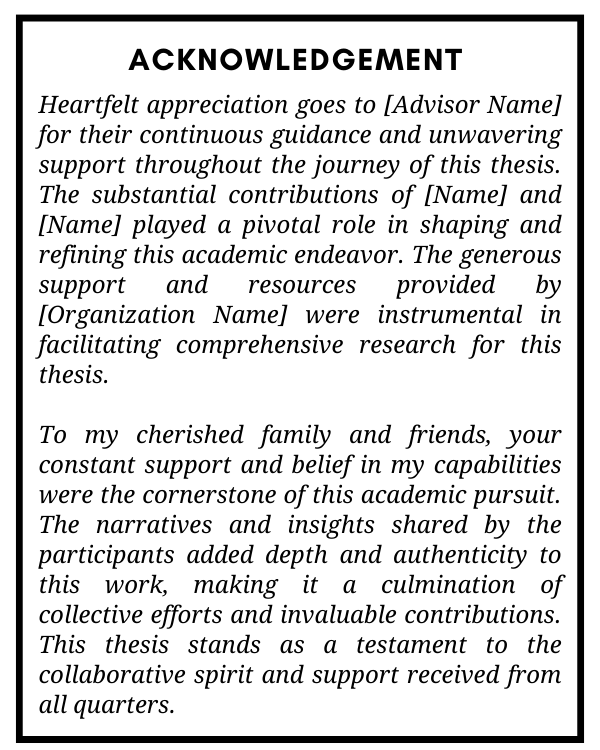
How to write acknowledgement for master thesis
When writing an acknowledgment for your master’s thesis, consider these steps:
Identify Key Contributors: Start by acknowledging the individuals or entities who played a significant role in your master’s thesis work. This could include your advisor, committee members, peers, family, friends, and any organizations or institutions that supported your research.
Express Gratitude: Use sincere and appreciative language to express your gratitude. Acknowledge their specific contributions, guidance, support, or encouragement and highlight how it impacted your master’s degree.
Be Personal and Genuine: Share personal sentiments if comfortable, expressing how their support or guidance was instrumental in your M.Phil journey. Avoid generic or overly formal language; instead, convey heartfelt thanks.
Consider Professional Courtesy: If acknowledging professionals or organizations, adhere to any guidelines or formalities required by them or your institution.
Keep it Concise and Respectful: Keep your MS thesis acknowledgment section concise but inclusive, ensuring that everyone you wish to thank is mentioned.
Here’s a generic structure:
- Start with a Grateful Tone: “I would like to express my sincere gratitude…”
- Name Specific Individuals or Entities: List the names of your advisor, committee members, family, friends, and any institutions.
- Detail Their Contributions: Briefly outline how each person or entity contributed. For example, “for their invaluable guidance,” “for their unwavering support,” etc.
- Conclude with Appreciation: End with a final expression of gratitude and the impact their support had on your thesis work.
Remember, the acknowledgment section is an opportunity to show appreciation to those who contributed to your academic journey. It’s a personal statement, so tailor it to reflect your genuine feelings of gratitude. Read tips for writing acknowledgment for your thesis.
Crafting a meaningful acknowledgment for a master’s thesis involves recognizing the various elements and individuals that contributed to its completion. These six samples serve as guiding beacons, illustrating the diverse ways to express gratitude and appreciation within academic work.
Tips to Achieve Maximum Writing Excellence With AI
Acknowledgement for phd thesis (5 samples and guide), leave a comment cancel reply.
Save my name, email, and website in this browser for the next time I comment.

Master Thesis Proposal
Proposal maker.

Thesis proposal is considered as the most important proposal when it comes to the academic system. Your thesis proposal becomes a guide to which your academic and career usually depends. The more it is being planned well, the more you will get good results or findings. One of the hardest part is when you start writing for a thesis proposal to decide for an appropriate topic. Writing thesis proposal is quite not easy but it surely prepares you to become worthy professionals someday. In this article, you will be able to know more about making a master thesis proposal.
10+ Master Thesis Proposal Examples
1. master thesis proposal template.
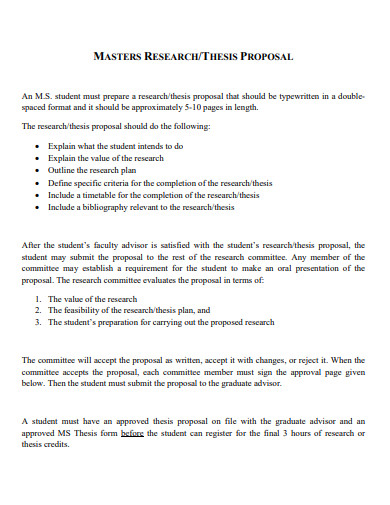
Size: 122 KB
2. Master Thesis Proposal Form
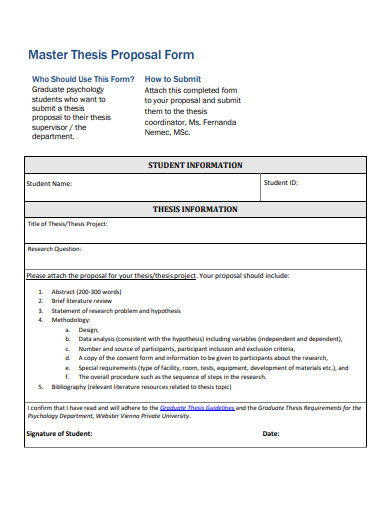
Size: 766 KB
3. Sample Master Thesis Proposal
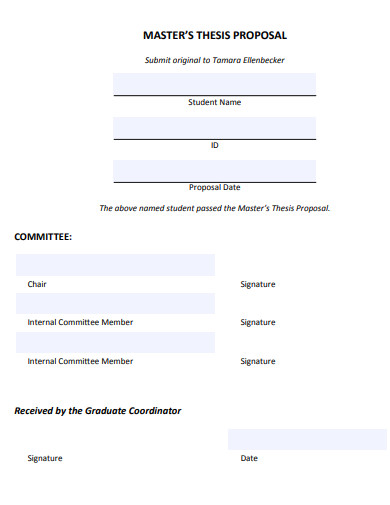
Size: 135 KB
4. Master Thesis Proposal in PDF
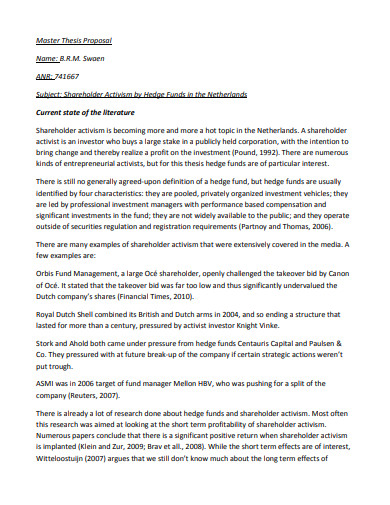
Size: 107 KB
5. Master Thesis Proposal Example
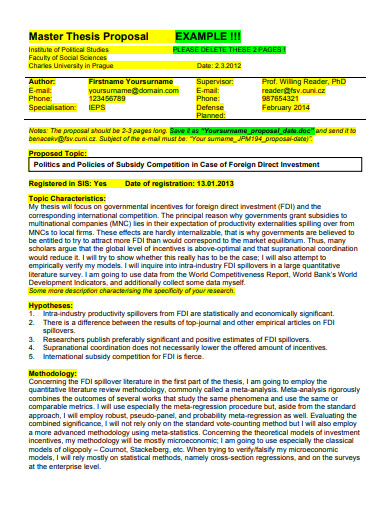
Size: 247 KB
6. Master Thesis Proposal Approval Form
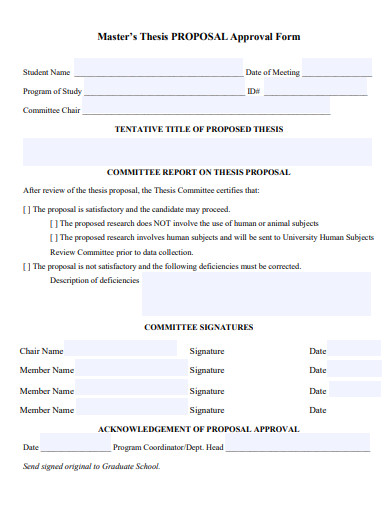
Size: 31 KB
7. Printable Master Thesis Proposal
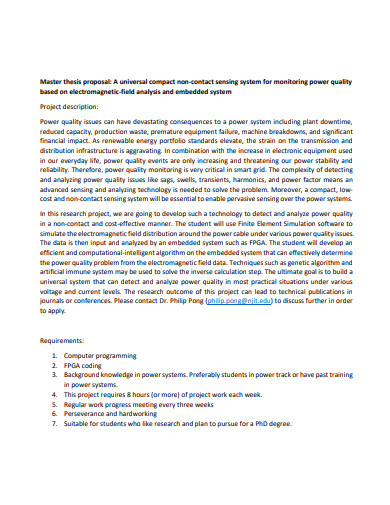
Size: 92 KB
8. Master Thesis Project Proposal
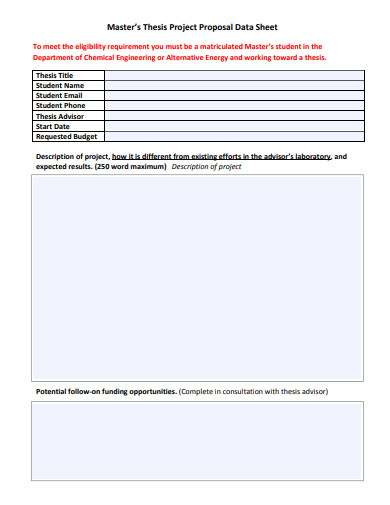
Size: 106 KB
9. Master Thesis Proposal Defense Form
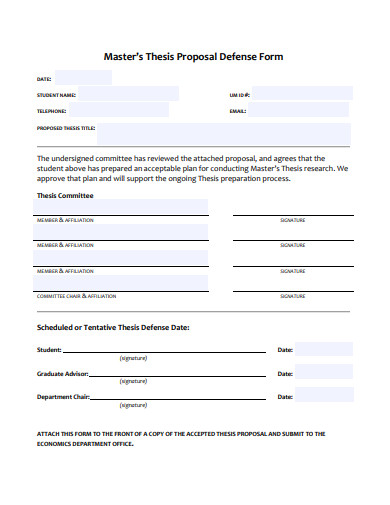
Size: 212 KB
10. Master of Arts Thesis Proposal
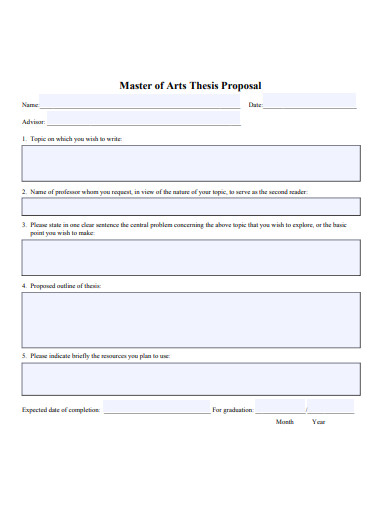
Size: 76 KB
11. Computer Science Master Thesis Proposal
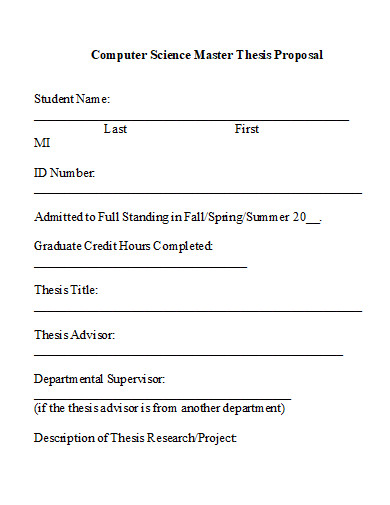
What is a Master Thesis Proposal?
Every school year for every graduating student, the goal is to complete a thesis which allows you to identify a research topic, formulate hypothesis, provide a background or rationale about your study, look for appropriate methods and collect data to get a result.
The purpose of thesis proposal is to present a topic that you think is essential in addressing a particular problem, plan in an organized manner regarding ways on how to collect and gather data to look for a possible solution and to decide what method is best for the data. You may also consider having thesis proposals to train you on how to improve your proposal writing because any degree program would really require you to do one.
Usually, most individuals or professionals are interested in the process on how the thesis proposal is being structured. All you need to do is to present a clear data and idea to relate your thesis idea into another existing study, justify its importance, describe how it is being investigated and to carry out a good conclusion.
Structure of Thesis Proposal
You master thesis proposal should have the following elements:
Title Page – this contains the descriptive title, name of the author, educational institution, department, name of your mentor and his or her institution and the date of delivery.
Abstract – abstract writing involves this is a short summary which contains up to a minimum of two hundred (200) words. It introduces an issue and would let you make a statement about it. It also contains your implication of your work.
Table of Contents – this is where you can see heading and subheadings incorporated with page numbers.
Introduction – this usually play the role in trying to catch you readers’ attention. In this area, you will be going to provide an explanation of the rationale. It should usually begin by discussing from the general perspective down to the specific ones until you reach to the research questions. This should be understandable to the readers.
Thesis Statement – state your thesis statement only in short sentences. This can be in a form of a question, statement or hypothesis. It should be able to capture the essence of your entire study.
Approach/Method used – this describes the approach and materials used and procedures. You should be able to include techniques, graphs and calculations, limitations and assumptions. Do not discuss yet your findings in the section.
Results and Discussion – present the information about your results and how are they going to fit in your theoretical framework.
Plan and Time Table – describe what are your plans until you are able to complete your entire thesis. List down your projects and their respective deadlines and the challenges that you have to overcome.
Implications – write down the list of knowledge that you think your audience still do not know anything about.
Reference – include a reference list on the last part of your proposal. This should include the citations of your concepts, text and data that you do not own. As much as possible, do not use footnotes and your references should be listed in alphabetical order.
How long is a thesis proposal?
It is approximately eight (8) pages long.
Does a thesis proposal requires a statement of the significance of the project?
Every type of research study requires a statement or a paragraph that consists of the study’s significance.
Does a thesis proposal requires a review of the related literature?
Yes. The review of related literature are the existing studies that you must incorporate in your thesis to show accuracy and support.
Generally, students really give serious consideration and effort when they begin writing a thesis. It should be made originally which helps in enhancing the skills good for every students’ expertise. Thesis proposal is your guide to writing an effective and well-written thesis or research study.
Text prompt
- Instructive
- Professional
Generate a proposal for a new school recycling program
Compose a proposal for a school field trip to a science museum.

Published Dissertation or Thesis References
This page contains reference examples for published dissertations or theses.
Kabir, J. M. (2016). Factors influencing customer satisfaction at a fast food hamburger chain: The relationship between customer satisfaction and customer loyalty (Publication No. 10169573) [Doctoral dissertation, Wilmington University]. ProQuest Dissertations & Theses Global.
Miranda, C. (2019). Exploring the lived experiences of foster youth who obtained graduate level degrees: Self-efficacy, resilience, and the impact on identity development (Publication No. 27542827) [Doctoral dissertation, Pepperdine University]. PQDT Open. https://pqdtopen.proquest.com/doc/2309521814.html?FMT=AI
Zambrano-Vazquez, L. (2016). The interaction of state and trait worry on response monitoring in those with worry and obsessive-compulsive symptoms [Doctoral dissertation, University of Arizona]. UA Campus Repository. https://repository.arizona.edu/handle/10150/620615
- Parenthetical citations : (Kabir, 2016; Miranda, 2019; Zambrano-Vazquez, 2016)
- Narrative citations : Kabir (2016), Miranda (2019), and Zambrano-Vazquez (2016)
- A dissertation or thesis is considered published when it is available from a database such as ProQuest Dissertations and Theses Global or PDQT Open, an institutional repository, or an archive.
- If the database assigns publication numbers to dissertations and theses, include the publication number in parentheses after the title of the dissertation or thesis without italics.
- Include the description “Doctoral dissertation” or “Master’s thesis” followed by a comma and the name of the institution that awarded the degree. Place this information in square brackets after the dissertation or thesis title and any publication number.
- In the source element of the reference, provide the name of the database, repository, or archive.
- The same format can be adapted for other published theses, including undergraduate theses, by changing the wording of the bracketed description as appropriate (e.g., “Undergraduate honors thesis”).
- Include a URL for the dissertation or thesis if the URL will resolve for readers (as shown in the Miranda and Zambrano-Vazquez examples).
- If the database or archive requires users to log in before they can view the dissertation or thesis, meaning the URL will not work for readers, end the reference with the database name (as in the Kabir example).
Published dissertation or thesis references are covered in the seventh edition APA Style manuals in the Publication Manual Section 10.6 and the Concise Guide Section 10.5

COMMENTS
These high-quality undergraduate, master's, and PhD research projects can help you work out how to start your own thesis or dissertation. ... Prize-Winning Thesis and Dissertation Examples. Published on September 9, 2022 by Tegan George. Revised on July 18, 2023. ... Tegan is an American based in Amsterdam, with master's degrees in political ...
Sample Thesis/Dissertation Approval (TDA) Form Doctoral Students. Do not include the TDA in the PDF thesis file. Use of Adobe Reader to ... for the degree of Master of Science in Food Science and Human Nutrition . in the Graduate College of the . University of Illinois at Urbana-Champaign, 20xx . Urbana, Illinois .
Get real-world examples of dissertations and theses spanning management, psychology, education, healthcare and more. ... Here we showcase a collection of dissertation and thesis examples to help you get started. All of these are real-world studies from actual degrees (typically PhD and Master's-level). PS ...
Revised on April 16, 2024. A thesis is a type of research paper based on your original research. It is usually submitted as the final step of a master's program or a capstone to a bachelor's degree. Writing a thesis can be a daunting experience. Other than a dissertation, it is one of the longest pieces of writing students typically complete.
1. Introduction. 1.1. Objectives. The purpose of a master degree thesis is to demonstrate your understanding. and mastery of a particular subject area and your ability to develop new. scientific knowledge independently. For these reasons, writing a thesis is. different from studying for exams.
Below a few examples of theses that scored well. Naik, Nilay Prashant (2023) Application Portfolio Management Maturity : A Grounded Theory investigation on the processes and expected benefits. Man, T. (2022) Modelling Security Architectures of Collaborative Networks.
Definition of Dissertation and Thesis. The dissertation or thesis is a scholarly treatise that substantiates a specific point of view as a result of original research that is conducted by students during their graduate study. At Cornell, the thesis is a requirement for the receipt of the M.A. and M.S. degrees and some professional master's ...
Dissertation & Thesis Outline | Example & Free Templates. Published on June 7, 2022 by Tegan George. Revised on November 21, 2023. A thesis or dissertation ... Tegan is an American based in Amsterdam, with master's degrees in political science and education administration. While she is definitely a political scientist at heart, her experience ...
Writing a masters dissertation or thesis is a sizable task. It takes a considerable amount of research, studying and writing. Usually, students need to write around 10,000 to 15,000 words. It is completely normal to find the idea of writing a masters thesis or dissertation slightly daunting, even for students who have written one before at ...
minimum of ten days for all members of the thesis committee to review the thesis. Step 1: Prepare the content of your presentation. The content of your presentation is the mirror of your thesis ...
A Thesis Proposal is a document that sets forth what is to be studied as a thesis project, why and in what way. It contains a number of important sections. The purpose of the proposal is to communicate the plan for the work to the faculty of the Division of Emerging Media Studies via the First Reader (principal thesis advisor) and a Second Reader.
The master's thesis is a unique piece of academic writing that enables students to delve deeply into a subject and develop an extensive report that illustrates how one's understanding has increased over the course of the master's degree programme. To support the underlying argument in the thesis paper, there is a requirement for ...
Dissertation & Thesis Template. As a resource for graduate students, sample Word templates are available to assist with the initial formatting of doctoral dissertations and master's theses. Students are expected to fully format their dissertation/thesis according to the "Preparation and Submission Manual for Doctoral Dissertations and Master's ...
Tip #2: Begin Work on the Thesis Statement and Break Up the Thesis into Manageable Sections. After selecting an appropriate topic and developing a central research question for the thesis statement, it is then necessary to apply the research and writing skills you have learned throughout your degree program.
First, you need to find a topic (or "thesis question"), often with the help and/or approval of your faculty-led thesis committee. Next comes the process of research, which is often the most time-intensive. Then, you must take the time to analyze your research. Lastly, you outline and write the actual thesis.
Master of Science Degree Department of Mathematics in the Graduate School Southern Illinois University Carbondale July, 2006 ... examples used in this sample research paper have been quoted. Another special thanks to Prof. Ronald Grimmer who provided the previous thesis template upon which much of this is based and for help with graphics ...
About. Below are downloads (PDF format) of the M.A. (Religion) theses of some of our graduates to date. Note: Certain requirements for current thesis students have changed since earlier theses were completed. Thesis Topic. Student. Year. Trinitarian Scriptures: The Uniqueness of the Bible's Divine Origin. Gregory Cline.
The thesis may take one of three forms: a research thesis, an artistic thesis, or a project thesis. In each case, the thesis represents a synthesis of the student's accumulated knowledge and skill and an opportunity to display the ideas, practices and skills learned through the program. While the master's thesis, unlike a doctoral ...
Foreword. This guidebook summarizes the procedures followed by the Office of Graduate Studies and Research for students who are planning to write theses for their master's degree. This manual also is intended to guide students in the elements and structure generally contained in a thesis as well as to provide a reference to the appropriate ...
OATD.org aims to be the best possible resource for finding open access graduate theses and dissertations published around the world. Metadata (information about the theses) comes from over 1100 colleges, universities, and research institutions. OATD currently indexes 7,214,592 theses and dissertations.
Clinical Psychology Masters Theses Collection. This collection contains open access and campus access Masters theses, made possible through Graduate Studies at the University of Massachusetts Boston. The full content of open access theses is available to all, although some files may have embargoes placed on them and will be made available as ...
Master Thesis Acknowledgement Example. In navigating my academic journey, my advisor, [Advisor Name], served as a guiding light, offering invaluable support and direction throughout the thesis. I extend my sincere appreciation to [Name] and [Name], whose contributions significantly shaped and refined this scholarly work.
You master thesis proposal should have the following elements: Title Page - this contains the descriptive title, name of the author, educational institution, department, name of your mentor and his or her institution and the date of delivery. Abstract - abstract writing involves this is a short summary which contains up to a minimum of two ...
This page contains reference examples for published dissertations or theses, ... Include the description "Doctoral dissertation" or "Master's thesis" followed by a comma and the name of the institution that awarded the degree. Place this information in square brackets after the dissertation or thesis title and any publication number.
PNSB Palau Fellowship Award Recipients Discuss Studying abroad and internships | August 7, 2024 | EPFM Studio